#the Albany Stewarts
Text



David Stewart, 1st Duke of Rothesay and heir to the throne of Scotland died on March 26th 1402.
In all the long history of the Stewart dynasty there are many tragic figures such as Mary, Queen of Scots and King Charles I, but surely there can be no more hapless and lamentable bearer of the name than the first prince to ever carry the title of the Duke of Rothesay.
David Stewart was the heir to the throne of Scotland at the end of the 14th century until he lost his claim to kingship, and his life, at the behest of his own uncle. His death occurred in the strangest of circumstances in this week of 1402.
t was a time of great jostling for power within the Stewart clan and their fellow Scottish aristocrats. David was born on or around October 24th, 1378, as the son of John, Earl of Carrick, the heir to the Scottish throne, and his wife Countess Anabella nee Drummond. On becoming King he took the name Robert as John and it’s association with the Balliol's’ was considered unlucky, the third to use the name.
Robert III had been kicked by a horse two years before his coronation and as well as physical injury he suffered from melancholia, or depression as we know it.
His younger brother, confusingly also called Robert, was the Earl of Fife who had assumed the Lieutenancy and taken control of the governance of Scotland in the early part of Robert III’s reign.
Both Fife and 19-year-old David Stewart were created Dukes, the first in Scotland, in 1398 after David was knighted at the Great Tournament of Edinburgh arranged by his mother. Fife became Duke of Albany and David became Duke of Rothesay, the title which has passed down to the heirs to the Scottish throne – Prince Charles is the current holder.
Albany’s grip on power had seemed secure at first but as her husband’s health deteriorated, Queen Anabella began to take more control, and she also pushed the cause of her son David as the heir, arranging for him to become the Lieutenant in 1399. The problem was David’s personality – he was a self-indulgent wild child, who grew increasingly debauched as his teens wore on.
He was also arrogant to a fault, and despite being engaged and probably married to Elizabeth Dunbar, daughter of the Earl of March, he decided for dynastic reasons to marry Mary Douglas, daughter of the hugely powerful 3rd earl of Douglas, known as Archibald the Grim.
The Earl of March was furious and switched allegiance to King Henry IV of England who promptly invaded Scotland but had to go home when Edinburgh Castle thwarted his siege. Poor David got the blame for the invasion and his already sagging popularity hit a new low.
When both Archibald the Grim and his mother died in 1401, the Duke of Rothesay was in a very vulnerable position as his uncle Albany moved to complete his control of the kingdom. Albany was assisted in this by Archibald, 4th Earl of Douglas who greatly disliked Rothesay.
Early in 1402, Albany moved to consolidate his power by conspiring with Archibald Douglas to have his nephew David arrested and imprisoned in Albany’s Falkland Palace in Fife on trumped up charges.
It was there that David died on March 26, 1402, most probably from starvation. Whether he was murdered or not is unknown. The official verdict was that Rothesay died of natural causes but the circumstances said otherwise.
His father, the virtually insane King Robert III, presided over a council of enquiry and had to put his name to a document which exonerated Albany and Douglas.
The King wrote: “We consider as excused the aforementioned Robert and Archibald, and anyone who took part in this affair with them, that is any who arrested, detained, guarded, gave them advice, and all others who gave them counsel, help or support, or executed their order or command in any way whatsoever, and in our said council we openly and publicly declared, pronounced and determined definitively and by the tenor of this our present document declare, pronounce, and by this definitive sentence judge them and each of them to be innocent, harmless, blameless, quit, free and immune completely in all respects.”
Robert even ordered the end to malignant rumours: “Wherefore we strictly order and command all and singular our subjects, of whatever standing or condition they be, that they do not slander the said Robert and Archibald and their participants, accomplices or adherents in this deed, as aforesaid, by word or action, nor murmur against them in any way whereby their good reputation is hurt or any prejudice is generated, under all penalty which may be applicable hereafter in any way by law.”
The opposition silenced, Albany was in complete control and remained so even after Robert III died in 1406, when David Stewart’s younger brother James became King. But having fled from the marauding Douglases, young James was at that time in the custody of the English court and would remain an exile for 18 years.
How much pressure was put on the King at this time is not known, however as insane as he was, he decided to send his other son, Prince James, aged only about 1, to France for safety. As you know from last Tuesday’s post, his ship was boarded by pirates and he ended up as a “guest” of the English, for the best part of 20 years.
When Robert III heard of his son's capture, he became even more depressed. He refused any food and died within a few days on April 4th, 1406.
Robert asked to be buried under a dunghill with the epitaph: Here lies the worst of Kings and the most miserable of men as he did not consider himself worthy of the honour. He ended up being buried in Paisley Abbey.
David Duke of Rothesay is said to have been buried at Lindores a Tironensian abbey on the outskirts of Newburgh in Fife, which never survived the vandalism of the Scottish Reformation.
Pics are Falkland Palace, then and now, and Lindores Abbey ruins.
21 notes
·
View notes
Text
We are still in the midst of COVID-19 pandemic. New Yorkers are still being hospitalized with COVID and still dying from COVID. People are still getting Long COVID and other serious health issues from COVID.
Everyone is at risk of Long COVID and other serious health issues from COVID.
Masks are a critical public health tool that help protect people from COVID.
Masks also help protect against other contagious diseases, wildfire smoke, pollution, allergens, and other health concerns.
Everyone has a right to wear a mask.
There should not be a mask ban. A mask ban puts the lives and health of all New Yorkers at risk.
WHAT CAN YOU DO?
This toolkit includes a letter you can send to your reps if you live in, are currently in, and/or travel to New York.
1. Contact Governor Hochul. Urge her not to ban masks.
Phone: 518-474-8390 (press 1 to leave a message, press 2 to speak to a person)
Email: https://governor.ny.gov/content/governor-contact-form
Mail:
The Honorable Kathy Hochul
Governor of New York State
NYS State Capitol Building
Albany, NY 12224
Twitter/X: @GovKathyHochul
Instagram and Threads: @GovKathyHochul
2. Contact your NYS Senator and Assemblymember. Urge them to speak out against mask bans and not to support mask ban legislation.
Find your state elected officials and their contact info at: https://www.usa.gov/elected-officials
Check to see if your NYS Senator or Assemblymember has taken a stance on mask bans on our New York Mask Ban Tracker at: http://bit.ly/NYMaskBanTracker
Please let us know if your NYS Senator or Assemblymember speaks out publicly against mask bans.
3. Contact NYS Senate and Assembly leadership. Urge them to speak out against mask bans and not to support mask ban legislation.
NYS Assembly Speaker Carl Heastie
Phone: 518-455-3791
Email: [email protected]
Twitter/X: @CarlHeastie
Instagram and Threads: @CHeastie
NYS Senate Majority Leader Andrea Stewart-Cousins
Phone: (518) 455-2585
Email: [email protected]
Twitter/X: @AndreaSCousins
Instagram and Threads: @AndreaStewartCousins
4. Contact NYS Senate and Assembly Health Committee Chairs. Urge them to speak out against mask bans and not to support mask ban legislation.
NYS Senate Health Committee Chair J. Gustavo Rivera
Phone:Albany Office - 518-455-3395
Email: [email protected]
Twitter/X: @NYSenatorRivera
Instagram: @NYSenatorRivera
NYS Assembly Health Committee Chair Amy Paulin
NOTE: Paulin is a co-sponsor for the mask ban bill A10057A.
Phone:Albany Office - 518-455-5585
Email: [email protected]
Twitter/X: @AmyPaulin
Instagram: @AmyPaulin1
5. Contact your local elected officials, including City Council Members and NYC Borough Presidents. Urge them to speak out against mask bans.
Find your city elected officials and their contact info at: https://www.usa.gov/elected-officials
6. Sign up for an account on the NY Senate webpage and let them know you oppose each of the mask ban bills. There is a question on the right side of the webpage for each bill that asks if you oppose or support the bill. Write that you oppose the bill. In addition, if possible, add a comment expressing opposition to the mask ban bills.
S09867
A10057A
A10043
S09194
7. Contact NYC Mayor Adams.
Email: https://www.nyc.gov/office-of-the-mayor/mayor-contact.page
Phone: 311 or 212-NEW-YORK outside NYC
Twitter: @NYCMayor and @NYCMayorsOffice
Mail:
Mayor Eric Adams
City Hall
New York, NY 10007
Instagram and Threads: @NYCMayor
8. For those not in NY State, you could contact the NY’s Tourism Board and let them know you won’t be traveling to NY State or are canceling your travel plans to NY State due to the proposed mask ban.
Email: [email protected]
Twitter/X: @I_LOVE_NY
Instagram: @ILoveNY
More info: https://www.iloveny.com/
9. Write a letter to the editor or op-ed. See examples below.
10. Post your opposition to a mask ban on social media and share why you still wear a mask. Use the hashtag #NoNYMaskBan.
11. If you are Jewish, sign on to this sign-on letter to state leaders organized by Jews for Mask Rights. This letter is open to all Jewish people affected by this legislation, whether as New Yorkers, commuters, or tourists.
12. Spread the word! Share a link to this toolkit (http://bit.ly/StopMaskBanNY) and graphics below to encourage other people to take action.
13. Wear a mask! Post a photo of yourself wearing a mask on social media.If you hold a public event, require masks at your event and post photos with everyone wearing a mask.
#nyc#long island#new york#jewblr#disability justice#disability wrath month#intersectionality#psa#long post
101 notes
·
View notes
Text
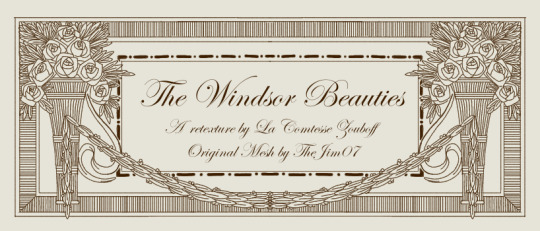

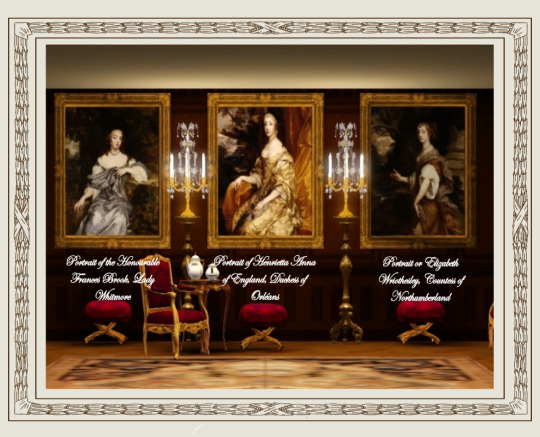
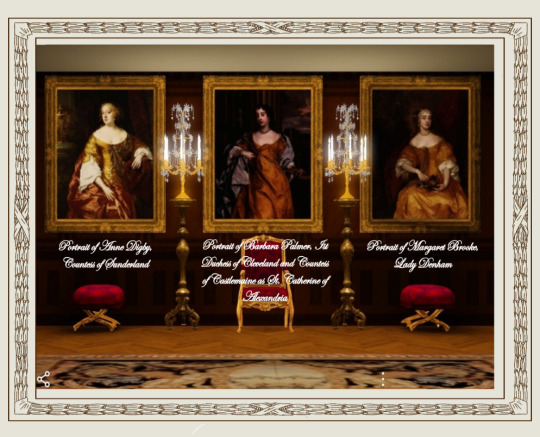
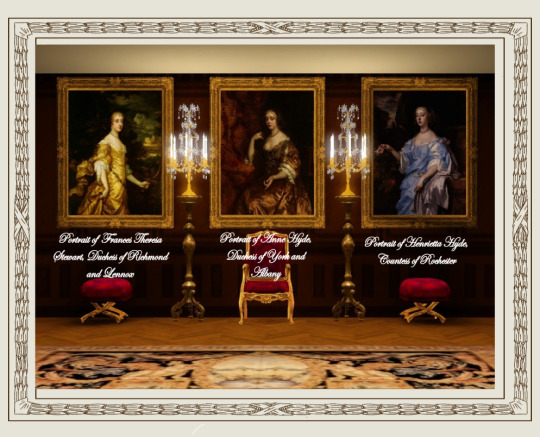
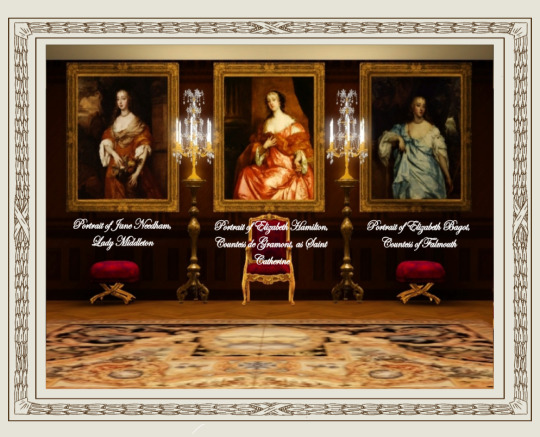
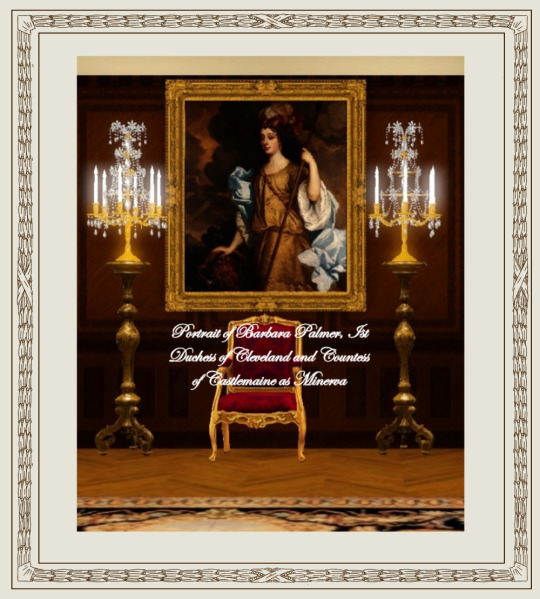
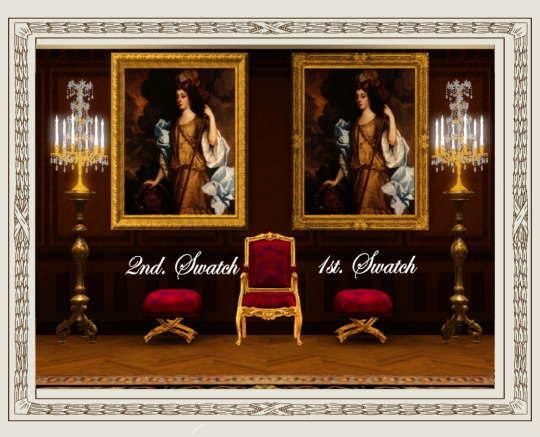
The Windsor Beauties Set
A retexture by La Comtesse Zouboff — Original Mesh by @thejim07
The Windsor Beauties are a set of portrait paintings, still in the Royal Collection, by Sir Peter Lely and his workshop, produced in the early to mid-1660s, that depict ladies of the court of King Charles II, some of whom were his mistresses. The name stems from the location of the collection, which was at Windsor Castle.
Originally commissioned by Anne Hyde, Duchess of York, the first mention of the paintings is by Samuel Pepys, describing them in his diary as being hung in "the Duke of York's room" in 1668. A 1674 inventory lists them as in the ducal rooms at St. James Palace and by 1688 they had moved to the "Princess's dressing room" at Windsor Castle. Moved to the castle's state rooms during the 18th century, the Windsor Beauties were transferred to Hampton Court at some time prior to 1835.
They are considered the pinnacle of restoration art and are regarded as one of Lely's most exquisite work.
The set includes 13 portraits, with the original frame swatches, fully recolorable. The portraits are of:
Anne Digby, Countess of Sunderland
Anne Hyde, Duchess of York and Albany
Barbara Palmer, Ist Duchess of Cleveland and Countess of Castlemaine as Minerva
Barbara Palmer, Ist Duchess of Cleveland and Countess of Castlemaine as St. Catherine of Alexandria.
Elizabeth Bagot, Countess of Falmouth
Elizabeth Hamilton, Countess de Gramont as Saint Catherine
Elizabeth Wriothesley, Countess of Northumberland
Frances Theresa Stewart, duchess of Richmond and Lennox
Henrietta Anne of England, Duchess of Orléans
Henrietta Hyde, Countess of Rochester
Jane Needham, Lady Middleton
Margaret Brooke, Lady Denham
The Honourable Frances Brook, Lady Whitmore
Found under Decor > Paintings for 1.650 §
Retextured from "Portrait of Cardinal de Mazarin" found here
Chairs, stools, side table and bronze "Pendule á Cercles Tournants" by @joojconverts
Walls, floor, torchere, girandole and table by @thejim07
Tea pot, milk jugar, sugar bowl and teacup by @aroundthesims
White vase by @martassimsbookcc
Rug by me (to be released)

(Drive)
(Sims3pack and Package)
(Useful tags below)
@joojconverts @ts3history @ts3historicalccfinds @deniisu-sims @katsujiiccfinds
-------------------------------------------------------
#the sims 3#ts3#sims 3 cc#sims 3#s3cc#sims 3 download#portrait#sims 3 paintings#retextures#La Comtesse Zouboff#baroque#englishbaroque#windsor castle#windsor beauties#sir peter lelly#sims 3 decor#historical cc find#sims 3 art#wall decor
68 notes
·
View notes
Text
If Sir Thomas Gray's letter of confession to Henry V can be believed, Cambridge in the summer of 1415 was entertaining fantastic delusions. He told Gray, who was staying at Conisborough castle on 17 June, that the Scottish regent, Robert Stewart (c. 1340-1420), duke of Albany, was willing to trade the pseudo-Richard II in exchange for one of eighteen prominent Englishmen, headed by Bishop Courtenay of Norwich (one of the king's most trusted councillors), and the head of the Nevill clan, the staunchly Lancastrian Ralph, earl of Westmorland, who was married to Henry V's aunt, Joan Beaufort. Needless to say, there was no possibility that men of high rank would put themselves at Cambridge's disposal or become available to be used as hostages in these bizarre negotiations. Perhaps the Scottish regent, unwilling to disclose that his puppet was no longer alive, and eager to keep up the pretence that Richard II still survived, had stated unacceptable terms to evade coming to an agreement with Cambridge. It should have been obvious to Sir Thomas Gray as he rode homewards that his host, the earl of Cambridge, had lost touch with reality, and memories of that astonishing conversation at Conisborough castle, when the two men rashly talked of treason, should have been enough to deter him from getting more deeply involved in such preposterous schemes.
T. B. Pugh, Henry V and the Southampton Plot (Alan Sutton, 1988)
#henry v#richard earl of cambridge#ralph neville earl of westmorland#joan beaufort countess of westmorland#richard courtenay bishop of norwich#sir thomas gray of heton#the southampton plot#historian: t. b. pugh#posting this because the idea of the southampton plot targetting hal's besties on top of everything else makes me feral
8 notes
·
View notes
Text
Events 7.22 (before 1900)
838 – Battle of Anzen: The Byzantine emperor Theophilos suffers a heavy defeat by the Abbasids.
1099 – First Crusade: Godfrey of Bouillon is elected the first Defender of the Holy Sepulchre of The Kingdom of Jerusalem.
1209 – Massacre at Béziers: The first major military action of the Albigensian Crusade.
1298 – Wars of Scottish Independence: Battle of Falkirk: King Edward I of England and his longbowmen defeat William Wallace and his Scottish schiltrons outside the town of Falkirk.
1342 – St. Mary Magdalene's flood is the worst such event on record for central Europe.
1443 – Battle of St. Jakob an der Sihl in the Old Zürich War.
1456 – Ottoman wars in Europe: Siege of Belgrade: John Hunyadi, Regent of the Kingdom of Hungary, defeats Mehmet II of the Ottoman Empire.
1484 – Battle of Lochmaben Fair: A 500-man raiding party led by Alexander Stewart, Duke of Albany and James Douglas, 9th Earl of Douglas are defeated by Scots forces loyal to Albany's brother James III of Scotland; Douglas is captured.
1499 – Battle of Dornach: The Swiss decisively defeat the army of Maximilian I, Holy Roman Emperor.
1587 – Roanoke Colony: A second group of English settlers arrives on Roanoke Island off North Carolina to re-establish the deserted colony.
1594 – The Dutch city of Groningen defended by the Spanish and besieged by a Dutch and English army under Maurice of Orange, capitulates.
1598 – William Shakespeare's play, The Merchant of Venice, is entered on the Stationers' Register. By decree of Queen Elizabeth, the Stationers' Register licensed printed works, giving the Crown tight control over all published material.
1686 – Albany, New York is formally chartered as a municipality by Governor Thomas Dongan.
1706 – The Acts of Union 1707 are agreed upon by commissioners from the Kingdom of England and the Kingdom of Scotland, which, when passed by each country's Parliament, leads to the creation of the Kingdom of Great Britain.
1793 – Alexander Mackenzie reaches the Pacific Ocean becoming the first recorded human to complete a transcontinental crossing of North America.
1796 – Surveyors of the Connecticut Land Company name an area in Ohio "Cleveland" after Gen. Moses Cleaveland, the superintendent of the surveying party.
1797 – Battle of Santa Cruz de Tenerife: Battle between Spanish and British naval forces during the French Revolutionary Wars. During the Battle, Rear-Admiral Nelson is wounded in the arm and the arm had to be partially amputated.
1802 – Emperor Gia Long conquers Hanoi and unified Viet Nam, which had experienced centuries of feudal warfare.
1805 – Napoleonic Wars: War of the Third Coalition: Battle of Cape Finisterre: An inconclusive naval action is fought between a combined French and Spanish fleet under Admiral Pierre-Charles Villeneuve of France and a British fleet under Admiral Robert Calder.
1812 – Napoleonic Wars: Peninsular War: Battle of Salamanca: British forces led by Arthur Wellesley (later the Duke of Wellington) defeat French troops near Salamanca, Spain.
1833 – The Slavery Abolition Act passes in the British House of Commons, initiating the gradual abolition of slavery in most parts of the British Empire.
1864 – American Civil War: Battle of Atlanta: Outside Atlanta, Confederate General John Bell Hood leads an unsuccessful attack on Union troops under General William T. Sherman on Bald Hill.
1893 – Katharine Lee Bates writes "America the Beautiful" after admiring the view from the top of Pikes Peak near Colorado Springs, Colorado.
1894 – The first ever motor race is held in France between the cities of Paris and Rouen. The fastest finisher was the Comte Jules-Albert de Dion, but the "official" victory was awarded to Albert Lemaître driving his three-horsepower petrol engined Peugeot.
1 note
·
View note
Text
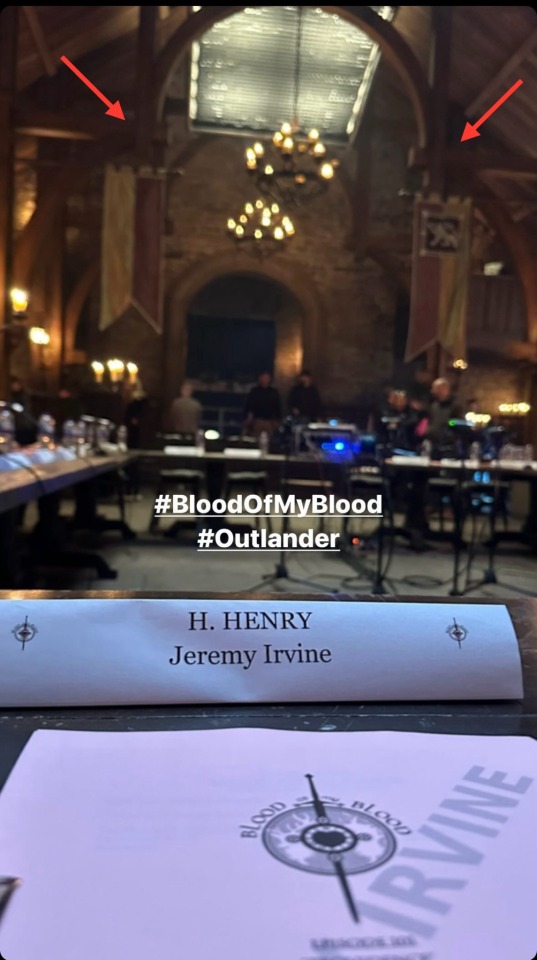
Situations where the camera would rather film than assist 🎬
Preparations are underway..
As we can see, this photo is all about the filming location, although it also gives you a specific location within Doune Castle. Jeremy Irvine's photo is very good because it is supposed to be the location of the Great Hall in the Castle (turned Castle Leoch) which also suggests it is used as 'table reading'.
A table read is one of the most important steps in the production process for any TV series. It offers an opportunity for the cast, crew, and other members of the creative team to gather together to hear the script read aloud. In the case of episodic television, these table reads usually occur towards the end of pre-production, before filming.
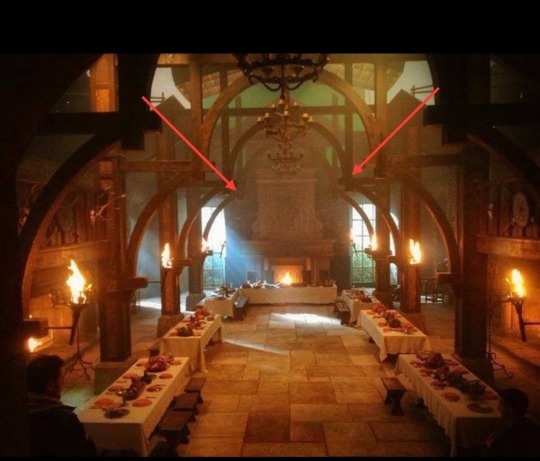
Photo Outlander Season 1 set
Built-in the 13th century, the castle is known for its striking 100-foot-high gatehouse and one of the best-preserved great halls in the country. Its battlements afford stunning views of the River Teith and Ben Lomond. Doune Castle, suffered much damage in the Wars of Independence. It was later rebuilt in its current form in the 14th century by Robert Stewart, Duke of Albany, who is nicknamed the 'uncrowned King of Scotland'. The son of King Robert Il of Scots, and Regent of Scotland until his death.
It has a long and colourful history. Mary Queen of Scots stayed there on several occasions, and Bonnie Prince Charlie used it as a garrison during the Jacobite Rebellion. It fell into disuse after the Jacobites were defeated and by the beginning of the 19th century, was in ruins.
Doune Castle near Stirling was used as Castle Leoch's seat of Clan Mackenzie in Season One of Outlander. It is also Winterfell in Game of Thrones, and featured in Outlaw King and Mary Queen of Scots and and the 1975 comedy film Monty Python and the Holy Grail.
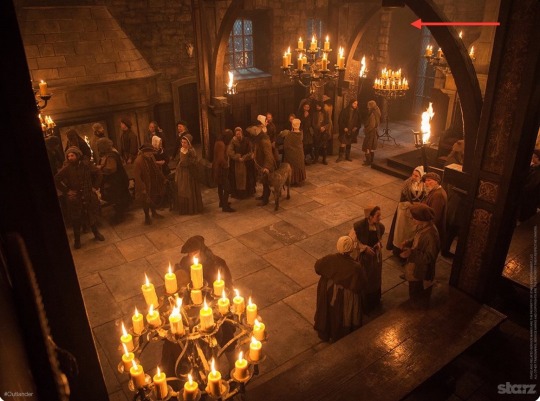
Photo Outlander Season 1 set
From Jeremy's photo it seems that to recreate the new look of BOMB from the 18th century, the set presented looks familiar. It's possible could be working on sets already created by Jon Gary Steele, former production designer on Outlander season 1.
He built a lot of 18th-century interiors retrofitted in Doune Castle, originally built in 1390, which served as the fictional Castle Leoch in Outlander series. Because it’s a historic Scottish landmark, there were/are prohibitions on what they could/can do there. Doune Castle, is one of Scotland’s most iconic heritage attractions.

Photo Outlander Season 1 set
In season 1 of Outlander, Castle Leoch was made very utilitarian. Many people lived there, either inside the premises or right outside it, in shacks and huts. If you watch the video below, BOMB continues along this line. The laird's part of the castle will be very comfortable, but for everyone else, it will make it like it really would have been, not too comfortable.
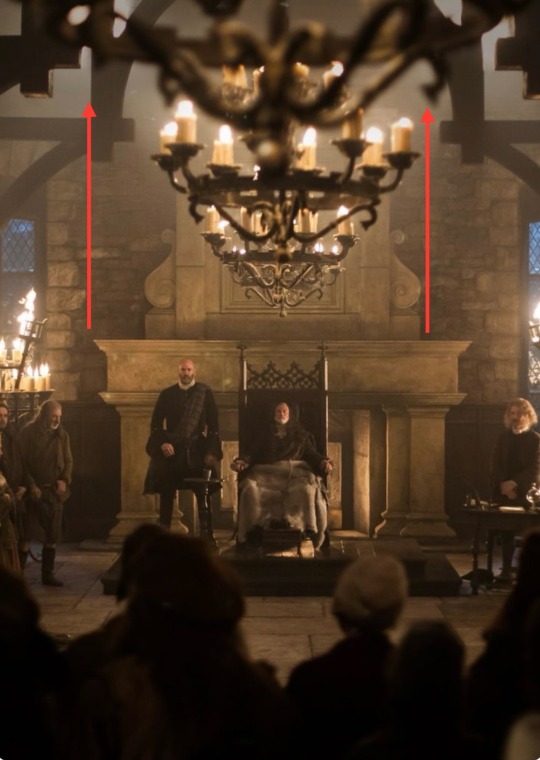
Doune Castle: It is built with exquisite curved wooden beams that give it a touch of elegance and architectural beauty. Raw materials are used in the series in a process that guarantees the integrity of the original structure. The curved laminated wood beams were made in season 1 of Outlander and adorn the Great Hall and continue in BOMB.
Combining craftsmanship and technique, aiming to shed light behind on the remarkable original structural element. In this case, what is missing from the photo is to show how they did it.
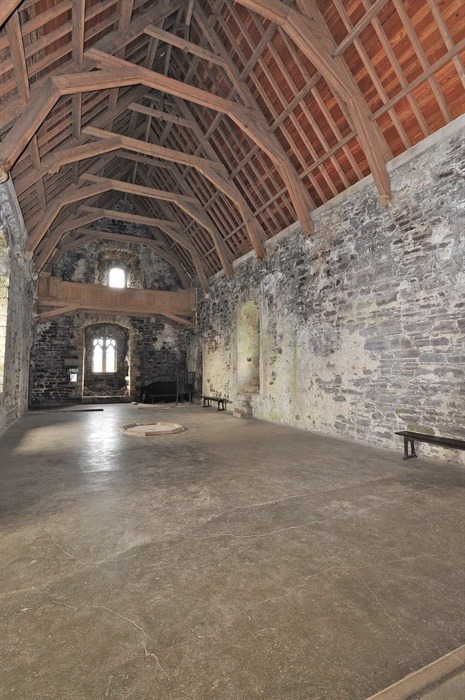
The Great Hall. The castle is known for having one of the best-preserved great halls in the country.

Great Hall interior looks East with arches that follow the curved structure.

Details Doune Castle interior set for filming

Upper chambers of the Gatehouse Tower
🎥 @ edinburghblackcabtours

Doune Castle will be closed until Wednesday 21 February 2024 for BOMB. filming inside and outside the castle📍
3 notes
·
View notes
Text
We need more from our leaders in Albany this year. Without a commitment to public investment and a fair tax system, the New York dream will remain unrealized.
Our full statement in response to Governor Hochul’s State of the State address:
NEW YORK WORKING FAMILIES PARTY
While many of Governor Hochul's proposals speak to the struggles facing working New Yorkers, we need more from our leaders in Albany this year. The housing and affordability crises, which have developed over decades of underinvestment and have been exacerbated by the pandemic, must be met with solutions that meet the scale of the problem.
At a time when millions of New Yorkers are struggling to pay rent and meet their basic needs, we need to both raise the minimum wage and make long overdue investments in permanently affordable housing, including green social housing, as well as pass Good Cause eviction protections and fund the Housing Access Voucher Program. We know that more tax breaks and subsidies for wealthy developers and corporate real estate have not delivered-and will not deliver-the kind of long-term stability that working families need.
To make New York affordable for working families, we must deepen our investment in child care and public education, including our SUNY and CUNY systems, and transition our communities to low-cost, publicly- controlled renewable energy. With House Republicans further rigging the rules to enshrine an unequal tax system, New York must ensure that the wealthiest among us pay what they owe in taxes. Without a commitment to public investment and a fair tax system, the New York dream will remain unrealized.
We support the Governor's focus on addressing the housing, medical, and comprehensive care needs of New Yorkers who live with chronic mental illness. The only solution to solving our mental health crisis is deep investments in the well-being of New Yorkers-not criminalization and forced intervention.
New York must continue on the progress we've made by building a more just and effective criminal legal system and fostering safety through investments in community-based violence prevention. We cannot further cede to bad faith Republican attacks on bail reform and other civil rights and racial justice protections. We thank Assembly Speaker Heastie and Senate Majority Leader Andrea Stewart-Cousins for continuing to hold the line on these evidence-based principles.
Finally, it's imperative that we curb the toxic influence of corporate interests and dark money in our politics by fully funding New York's forthcoming small donor matching program for state elections. The $114.5 million requested by the Public Campaign Finance Board is a crucial investment in our democracy and will strengthen the voice of everyday New Yorkers.
We remain committed to pushing both the Governor and the State Legislature to pass a budget that meets the moment and creates a healthy, safe, and affordable New York for all.
NYWFP
#leftist#capitalismsucks#unionstrong#bernie sanders#fightfor15#livingwage#raisethewage#taxtherich#justice democrats#abolishthecia#endprivateprisons#endqualifiedimmunity#capitalismfailed#workers of the world unite#working families#new york
3 notes
·
View notes
Text
International Queens/Empress Consorts (1/?)
Margaret Tudor, Queen of Scotland (28 November 1489-18 October 1541)
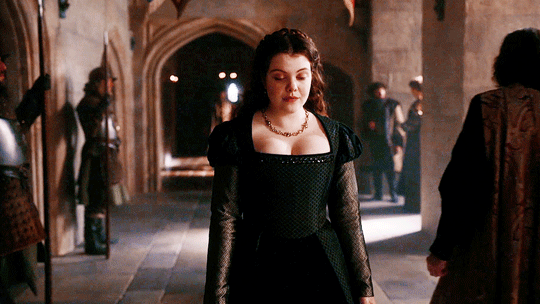
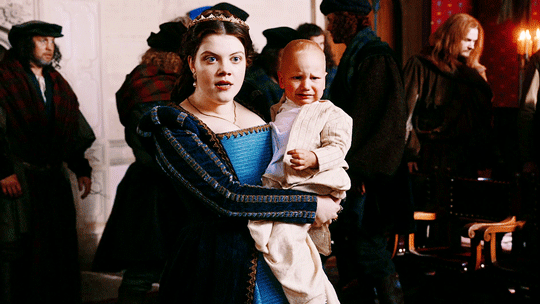
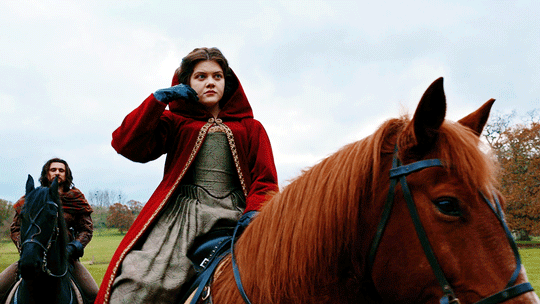
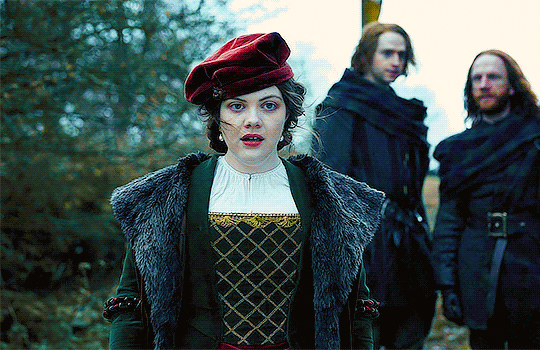
Daughter of King Herny VII and Elizabeth of York
Mother of James Stewart (Duke of Rothesay), Arthur Stewart (Duke of Rothesay), James V or Scotland, Alexander Stewart (Duke of Ross), Margaret Stewart (Countess of Lennox) and Dorothea Stewart
Wife of James IV of Scotland (m. 1503; died 1513), Archibald Douglas, 6th Earl of Angus (m. 1514; div 1527), and Henry Stewart, 1st Lord Methven (m. 1527)
Mother-in-law of Madeleine of France, Mary of Guise, and Matthew Stewart, 4th Earl of Lennox
Grandmother of James (Duke of Rothesay), Athur or Robert (Duke of Albany), Mary Stuart (Queen of Scots), James Stewart (Commander of Kelso and Melrose), James Stewart (1st Earl of Moray), Adam Stewart (Prior of Perth), James Stewart, John Stewart (Commander of Coldingham), Jean Stewart, Robert Stewart (1st Earl of Orkney; Commander of Holyrood), Henry Stewart (Lord Darnley), and Charles Stuart (1st Earl of Lennox)
5 notes
·
View notes
Text



🖤 The B~heading Stone ~ Stirling, Scotland 🖤
🖤 High on a hill, overlooking the River Forth with views of the Wallace Monument and surrounding vistas, stands a chunk of stone with a dark past.
Origins of the stone remain unknown, but according to local legend, the stone was used for b~headings in the 15th-century.
🖤 The stone in Stirling, Scotland, stands on “Mote Hill” or more appropriately named “The Heading Hill,” a spot where an ancient Pictish Fort once stood.
Over time, this area became the place where King James I would have his enemies dispatched.
B~headings were specifically reserved for individuals found guilty of committing treason.
Most notably was Murdoch, Duke of Albany in 1425, the grandson of King Robert II, founder of the Stewart Dynasty.
🖤 Today, the stone no longer serves as a chopping block.
It’s covered by a metal cage and rests on a large, white, circular pillar with a metal plaque reading;
“B~heading Stone, Protected by the Public at the
Insistence of the Stirling National History &
Archaeological Society 1887.”
The Tudor Intruders (and more)
🖤 Source~AtlasObscura
0 notes
Text
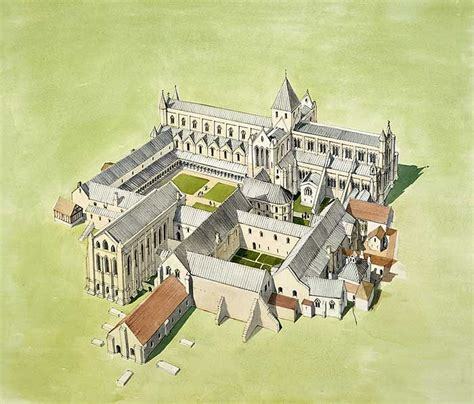


David Stewart, 1st Duke of Rothesay was born on October 24th 1378.
David was the son of John, Earl of Carrick and heir to the throne, and Annabella Drummond. His grandfather was King Robert II, who was himself the grandson of Robert I the Bruce. Robert III had been kicked by a horse two years before his coronation and as well as physical injury he suffered from melancholia, or depression as we know it.
The King’s younger brother, confusingly also called Robert, was the Earl of Fife and he assumed the Lieutenancy and took control of the governance of Scotland during the early part of Robert III’s reign.
The Earl of Fife and 19-year-old David Stewart were created Dukes, the first in Scotland, in 1398, David was created Duke of Rothesay, his uncle, Duke of Albany. Albany’s grip on power had seemed secure at first but as her husband’s health deteriorated, Queen Anabella began to take more control, and she also pushed the cause of her son David as the heir, arranging for him to become the Lieutenant in 1399. The problem was David’s personality – he was a self-indulgent wild child, who grew increasingly debauched as his teens wore on.
He was also arrogant to a fault, and despite being engaged and probably married to Elizabeth Dunbar, daughter of the Earl of March, he decided for dynastic reasons to marry Mary Douglas, daughter of the hugely powerful 3rd earl of Douglas, known as Archibald the Grim.
The Earl of March was furious and switched allegiance to King Henry IV of England who promptly invaded Scotland but had to go home when Edinburgh Castle thwarted his siege. Poor David got the blame for the invasion and his already sagging popularity hit a new low.
When both Archibald the Grim and his mother died in 1401, the Duke of Rothesay was in a very vulnerable position as his uncle Albany moved to complete his control of the kingdom. Albany was assisted in this by Archibald, 4th Earl of Douglas who greatly disliked Rothesay.
Early in 1402, Albany moved to consolidate his power by conspiring with Archibald Douglas to have his nephew David arrested and imprisoned in Albany��s Falkland Palace in Fife on trumped up charges.
It was there that David died on March 26, 1402, most probably from starvation. Whether he was murdered or not is unknown. The official verdict was that Rothesay died of natural causes but the circumstances said otherwise.
His father, the weak and ineffectual King Robert III, presided over a council of enquiry and had to put his name to a document which exonerated Albany and Douglas. He wrote:
“We consider as excused the aforementioned Robert and Archibald, and anyone who took part in this affair with them, that is any who arrested, detained, guarded, gave them advice, and all others who gave them counsel, help or support, or executed their order or command in any way whatsoever, and in our said council we openly and publicly declared, pronounced and determined definitively and by the tenor of this our present document declare, pronounce, and by this definitive sentence judge them and each of them to be innocent, harmless, blameless, quit, free and immune completely in all respects.”
Robert even ordered the end to malignant rumours:
“Wherefore we strictly order and command all and singular our subjects, of whatever standing or condition they be, that they do not slander the said Robert and Archibald and their participants, accomplices or adherents in this deed, as aforesaid, by word or action, nor murmur against them in any way whereby their good reputation is hurt or any prejudice is generated, under all penalty which may be applicable hereafter in any way by law.”
The opposition silenced, Albany was in complete control and remained so even after Robert III died in 1406, his younger son James became King. But having fled from the marauding Douglas's, young James was at that time in the custody of the English court and would remain an exile for 18 years.
Pics are of Falkland Palace, where Rothesay died and Lindores Abbey, Fife, where he is said to have been buried. The third is a reconstruction of the Abbey.
23 notes
·
View notes
Text
Grainne Hunt at Lost & Found in Albany with Ryan Leddick
April 2024
0 notes
Text
LÉGENDES DU JAZZ
HARRY JAMES, LES HAUTS ET LES BAS D’UN CHEF D’ORCHESTRE
“He had a black sound, and it was obvious he had been raised musically around black musicians. He was completely different from any other white trumpet player of his day.”
- Lionel Hampton
Né le 15 mars 1916 à Albany, en Georgie, Harry Haag James était le fils d’Everett Robert James, et de Myrtle Maybelle (Stewart). Le père de James était un chef d’orchestre qui jouait dans un cirque itinérant, le Mighty Haag Circus, et sa mère était acrobate et conductrice de chevaux. Sa soeur aînée était funambule.
Véritable enfant-prodige, James avait commencé à se produire dans un cirque à partir de l’âge de trois ans. Après avoir appris à jouer de la batterie à l’âge de sept ans (il avait même remplacé le batteur du cirque en donnant deux spectacles par soir), James avait commencé à apprendre la trompette avec son père trois ans plus tard. En fait, James était si talentueux qu’il avait commencé à diriger un des groupes du Christy Brothers Circus à l’âge de douze ans. Également contortionniste, James avait commencé à faire des acrobaties à l’âge de cinq ans sous le nom de “The Human Eel.” Malheureusement, après être entré en collision avec une cheval, une opération aux mastoïdes avait mis fin à la carrière de contortionniste de James, qui s’était alors tourné vers la trompette.
Le père de James lui avait donné un horaire très strict. Pour chaque leçon, James devait apprendre quelques pages de la méthode de trompette de J.B. Arban et n’était pas autorisé à poursuivre aucun autre passe-temps jusqu’à ce qu’il les ait complètement maîtrisées. Mais James avait relevé le défi. James, qui apprenait rapidement, s’était bientôt produit avec plusieurs groupes du Texas.
En 1924, la famille James s’était installée à Beaumont, au Texas. James était étudiant au Dick Dowling Junior High School lorsqu’il était devenu un membre régulier du Royal Purple Band du Beaumont High School. En mai 1931, James avait été couronné meilleur trompettiste soliste dans le cadre du concours annuel organisé par la Texas Band Teacher's Association à Temple, au Texas. James avait été surnommé "The Hawk" en raison de son habileté à lire la musique. Une plaisanterie avait même prétendu que si une mouche s’était posée sur une de ses partitions, James aurait été capable de la jouer...
DÉBUTS DE CARRIÈRE
Au début des années 1930, à l’âge d’environ quinze ans, James avait commencé à jouer avec des groupes de danse locaux. À l’époque, James se produisait aussi régulièrement avec le groupe d’Herman Waldman. C’est dans le cadre d’une de ses performances avec le groupe que James avait été remarqué par le célèbre chef d’orchestre Ben Pollack. C’est lors de sa collaboration avec Pollack en 1935 que James avait rencontré sa future épouse, la danseuse et chanteuse Louise Tobin. James avait découvert Tobin un peu par accident en écoutant l’émission "Dance Parade" diffusée sur les ondes de la station new-yorkaise WNEW.
James avait quitté le groupe de Pollack en décembre 1937 pour se joindre à l’orchestre de Benny Goodman dont il avait fait partie jusqu’en 1938.
Avec le groupe de Goodman, James avait formé ce qu’on avait appelé le “powerhouse trio” avec les trompettistes Ziggy Elman et Chris Griffin qui était devenu une des meilleures sections de trompettes de l’histoire du jazz. Ravi de sa nouvelle acquisition, Goodman avait déclaré au sujet du trio qu’il s’agissait de la meilleure section de trompette de l’histoire depuis l’époque de Fletcher Henderson. L’opinion de Goodman était d’ailleurs partagée par d’autres chefs d’orchestre comme Glenn Miller qui avait qualifié le trio de ‘’Marvel of the Age." Un des membres de l’orchestre, Chris Griffin, se souvenait particulièrement des commentaires de Duke Ellington. Griffin expliquait: "The best compliment we ever got, is when Duke Ellington once said we were the greatest trumpet section that ever was, as far as his liking."
Devenu le principal soliste du trio, James était devenu une grande vedette après avoir joué en solo sur les pièces “Ridin’ High” “Sing, Sing, Sing” et “One o’Clock Jump.” Dans le cadre de sa collaboration avec Goodman, James avait également composé et arrangé la chanson “Life Goes to a Party” qui était devenue une des meilleurs pièces du répertoire de l’orchestre. Dans sa biographie de James intitulée ‘’Trumpet Blues: The Life of Harry James’’ publiée en 1999, Peter J. Levinson avait mentionné quelques musiciens qui avaient témoigné de l’impact du trompettiste sur le groupe de Goodman, dont Jimmy Maxwell. Trompettiste lui-même, Maxwell avait déclaré: “...When Harry joined the band, it got looser, much looser. It just totally changed like it had been electrified.’’ Très populaire, James avait été couronné meilleur trompettiste dans le cadre des sondages des magazines Down Beat et Metronome en 1937. En 1938, James avait connu un des grands sommets de sa carrière en accompagnant l’orchestre de Goodman dans le cadre du célèbre concert de Carnegie Hall. Décrivant sa collaboration avec Goodman, James avait commenté: "Benny's too great a guy to work for!"
Avec l’aide financière de Goodman, James avait formé son propre big band en janvier 1939. Même si l’orchestre avait livré sa première performance au Benjamin Franklin Hotel de Philadelphie le 9 février, il n’avait vraiment connu du succès qu’après avoir ajouté une section de cordes à son orchestre en 1941. Le 20 février 1939, l’orchestre avait fait ses premiers enregistrements pour les disques Brunswick. Même si les premières pièces enregistrées par le groupe n’avaient pas été très impressionnantes, les spectateurs et les auditeurs des émissions de radio avaient été comblés. James semblait également ravi. Lorsqu’on avait demandé à James s’il avait fait une erreur en quittant le groupe de Goodman, il avait simplement répondu: "No, I don't think I made any mistake when I left Benny. When I was with Benny, I often had to play sensational horn. I was one of a few featured men in a killer-diller band. Each of us had to impress all the time. Consequently, when I got up to take, say, sixteen bars, I'd have to try to cram everything into that short space." Doté d’une mémoire phénoménale, James pouvait non seulement se rappeler parfaitement de ses propres partitions, mais également de celles des autres membres de son orchestre.
Dès le départ, James avait décidé de concentrer son attention sur les ballades, particulièrement sur des pièces comme "I Surrender, Dear," "Just a Gigolo," "I'm in the Market for You" et "Black and Blue." Il expliquait: "Playing what you want to play is good for a guy's soul, you know.’’ Témoignant de l’importance de la danse pour son orchestre, James avait ajouté: "I want to have a band that really swings and that's easy to dance to all the time. Too many bands, in order to be sensational, hit tempos that you just can't dance to." À l’époque, Glenn Miller venait d’ailleurs de former son propre groupe qui mettait l’accent sur des pièces au tempo rapide. James poursuivait: "We're emphasizing middle tempos. They can swing just as much and they're certainly more danceable."
Les uniformes de l’orchestre avaient d’ailleurs contribué à ajouter encore plus de couleur. James avait grandi dans un cirque, et ses goûts personnels avaient reflété cette réalité. Les musiciens du groupe portaient des vestons de couleur rouge plutôt voyants qui avaient contribué au caractère spectaculaire de la formation. Malgré tout, James avait continué d’afficher un tempérament sincère et plutôt candide. Partisan d’une approche informelle, James avait maintenu une très grande proximité avec ses musiciens.
En juin 1939, l’orchestre de James se produisait au Paramount Theater de New York. James était toujours au lit lorsqu’il avait entendu le groupe d’Harold Arlen jouer à Englewood, au New Jersey. James avait été particulièrement impressionné par le jeune chanteur du groupe dont il avait oublié de noter le nom. Le lendemain soir, après avoir présenté son concert, James s’était précipité au New Jersey pour faire connaissance avec le jeune chanteur. Il expliquait: "I asked the manager where I could find the singer, and he told me, 'We don't have a singer. But we do have an MC who sings a little bit.'"
Le maître de cérémonie en question était nul autre que Frank Sinatra. Après que Sinatra ait chanté quelques chansons, James avait été suffisamment convaincu pour lui faire une offre. Même si Sinatra avait accepté l’offre de James, ce dernier avait eu moins de succès lorsqu’il avait tenté de lui faire changer de nom pour adopter celui de ‘’Frankie Satin.’’ James précisait: "He did, and we made a deal. It was as simple as that. There was only one thing we didn't agree on. I wanted him to change his name because I thought people couldn't remember it. But he didn't want to. He kept pointing out that he had a cousin up in Boston named Ray Sinatra and he had done pretty well as a bandleader, so why shouldn't he keep his name?"
Sinatra avait enregistré ses premières pièces avec le groupe le 13 juillet 1939. Les chansons enregistrées étaient "From the Bottom of My Heart" et "Melancholy Mood." Mais le jeune chanteur manquait encore de confiance en lui et avait besoin d’encouragement. James avait rapidement su mettre en confiance son nouveau poulain et avait vite établi une excellente relation avec lui.
Premier chef d’orchestre important à engager Sinatra, James lui fait avait fait signer un contrat de 75$ par semaine en 1939 (l’équivalent de 1589$ par semaine au cours de 2022). En réalité, Sinatra n’avait d’abord été engagé que pour une durée de six mois. Ironiquement, la chanson “All or Nothing at All” avait été échec lorsque James et Sinatra l’avaient enregistrée initialement en 1939, mais elle avait vendu plus d’un million de copies lorsque le groupe l’avait de nouveau enregistrée en 1943. L’arrangeur Jack Matthias avait d’ailleurs écrit d’excellents arrangements pour Sinatra.
Sinatra avait fait partie de l’orchestre de James durant sept semaines avant de se joindre au groupe de Tommy Dorsey en 1940. L’orchestre de James comprenait aussi la chanteuse Helen Forrest. Par la suite, le batteur Buddy Rich et le contrebassiste Thurman Teague avaient également fait partie du groupe. Parmi les autres membres de la formation, on remarquait le saxophoniste et chanteur Johnny MacAfee, les saxophonistes Corky Corcoran, Claude Lakey, Vido Musso, Sam Donahue et Dave Matthews, le tromboniste Dalton Rizzotti et le pianiste Jack Gardner.
Après avoir terminé son contrat au Roseland Ballroom, l’orchestre s’était rendu à Los Angeles où il avait joué dans un restaurant appelé le Victor Hugo. C’est alors que les problèmes avaient commencé. James expliquait: "The owner kept telling us we were playing too loud. And so he wouldn't pay us. We were struggling pretty good and nobody had any money, so Frank would invite us up to his place and Nancy would cook spaghetti for everyone."
Après le séjour avorté en Californie, l’orchestre était parti pour Chicago et s’était produit à l’Hôtel Sherman. C’est alors que Sinatra, dont l’épouse Nancy était enceinte, avait quitté le groupe pour se joindre à l’orchestre de Tommy Dorsey. C’est Dick Haymes qui avait pris la relève de Sinatra avec le groupe.
Même si les disques de l’orchestre ne se vendaient pas toujours très bien, James avait continué d’être adulé par ses musiciens. En janvier 1940, James avait même été couronné meilleur trompettiste dans le cadre de deux sondages du magazine Metronome. Le groupe était alors retourné jouer au Roseland Ballroom, où il avait excellé. Mais James avait d’autres ambitions que de jouer uniquement dans les salles de danse et les rares hôtels qui n’interdisaient pas les groupes de swing.
Lorsqu’il avait quitté l’orchestre de Goodman en 1939 pour former son propre groupe, James n’avait pas tardé à se rendre compte que le fait de diriger un groupe viable sur le plan commercial exigeait davantage d’habilité que d’être uniquement un musicien talentueux dans l’orchestre de quelqu’un d’autre.
Après avoir connu des difficultés financières, il était devenu de plus en plus difficile pour James de payer les salaires de ses musiciens. En 1940, les disques Columbia avaient mis fin au contrat de James (il en avait signé un nouveau en 1941). Comme si ce n’était pas suffisant, Sinatra avait quitté le groupe en janvier 1940. Déterminé à revenir au sommet et à relancer son groupe, James avait décidé de jouer le tout pour le tout en adoptant un style plus doux, en ajoutant des cordes à son orchestre et en sélectionnant un répertoire plus commercial qui était beaucoup moins conforme à ses racines jazz. La décision avait éventuellement été profitable pour James qui avait eu plusieurs succès au Hit Parade. En 1945, un rapport du département du Trésor avait d’ailleurs mentionné James et son épouse Betty Grable comme le couple le mieux payé au pays. James avait également fait quelques changements à son alignement, en remplaçant notamment le saxophoniste Dave Matthews par Claude Lakey.
Après avoir terminé son contrat avec les disques Varsity, James était retourné chez Columbia. À l’époque, Columbia avait un très astucieux directeur du recrutement appelé Morty Palitz qui avait connu du succès avec la chanteuse Mildred Bailey et les compositeurs Eddie Sauter et Alec Wilder. C’est d’ailleurs Palitz qui avait suggéré à James de se doter d’une section de bois et d’un quatuor à cordes. Contre toute attente, James avaient réussi là où de grands chefs d’orchestre comme Artie Shaw et Glenn Miller avaient échoué. James avait expliqué: "I'm going to add strings and maybe even a novachord. Then we'll be able to play anywhere.’’ En avril 1941, l’orchestre avait remporté un grand succès avec la chanson “Music Makers” qui lui avait valu d’être surnommé “Harry James and His Music Makers”.
Avec son nouvel orchestre, James avait enregistré des pièces très audacieuses comme "The Flight of the Bumble Bee," "The Carnival of Venice" ainsi qu’une "Trumpet Rhapsody" en deux parties. Contrairement à des groupes comme ceux de Duke Ellington et Count Basie, l’orchestre de James avait adopté comme musique-thème la pièce “Chiribiribin”, une ancienne chanson folklorique européenne.
Le 20 mai 1941, James avait commis l’impensable en enregistrant la pièce ‘’You Made Me Love You’’ avec son orchestre à cordes. Même si la pièce avait été très mal reçue par les puristes du jazz, elle avait remporté un grand succès commercial. L’orchestre de James était de retour au sommet. James avait publié la pièce ‘’You Made Me Love You’’ pour une simple raison: il avait adoré la façon dont Judy Garland avait interprété la chanson.
Grand amateur de baseball, James avait également enregistré une pièce en l’honneur des Dodgers de Brooklyn intitulée "Dodgers' Fan Dance." Si la pièce n’avait pas remporté un grand succès, tel était loin d’être le cas de la chanson "You Made Me Love You" qui avait changé radicalement le son du groupe. Devenue le plus grand succès de l’histoire du groupe, la chanson avait atteint la cinquième position du palmarès Billboard en novembre 1941. Du début de novembre 1941 jusqu’à la fin de janvier 1942, le simple avait passé dix semaines consécutives sur le Top Ten. Le groupe avait poursuivi sur sa lancée au cours des années suivantes avec des succès comme “I Don’t Want to Walk Without You”, “I’ll Get By” et “I’m Beginning to See the Light.” En fait, l’orchestre de James était si populaire à l’époque que les disques Columbia n’avaient pu imprimer suffisamment de copies pour répondre à la demande.Tout en continuant de jouer du swing, le groupe s’était concentré de plus en plus sur les ballades qui mettaient en vedette le son de James, avait écrit le magazine Metronome, ‘’with an inordinate amount of feeling, though many may object, and with just cause, to a vibrato that could easily span the distance from left field to first base."
Ironiquement, la chanson "You Made Me Love You" n’avait pas été publiée avant quelques mois, possiblement parce que les dirigeants de Columbia partageaient les réserves des critiques de jazz au sujet de l’utilisation de cordes. Sur la face B, on retrouvait une des meilleures ballades du groupe, "A Sinner Kissed an Angel’’, qui avait contribué à démontrer quel grand chanteur Dick Haymes était devenu. À la même époque, Haymes avaient également enregistré d’autres chansons remarquables comme ‘’I'll Get By," "You Don't Know What Love Is" et "You've Changed."
Avec des chanteurs comme Sinatra et Haymes, James croyait sans doute qu’il n’avait pas besoin de chanteuse. Après avoir eu des chanteuses comme Bernice Byers puis Connie Haines lors des premières années d’activité de son orchestre, James avait recruté en mai 1941 Helen Ward, l’ancienne chanteuse de Benny Goodman, à qui il avait fait enregistré une nouvelle version de ‘’Daddy.’’ Par la suite, James avait eu à son emploi la showgirl Dell Parker qui avait été remplacée en juillet 1940 par Lynn Richards. Mais aucune de ces chanteuses ne s’était vraiment détachée du lot avant l’arrivée d’Helen Forrest. Après avoir enregistré quelques excellentes pièces avec Artie Shaw et Benny Goodman, Forrest avait fini par tout claquer à la fin de 1941, car elle ne pouvait plus supporter le tempérament autoritaire de Goodman qui lui avait presque fait faire une dépression nerveuse. De sa propre initiative, Forrest avait alors décidé de contacter James. Elle expliquait:
"I decided to contact Harry. I loved the way he played that trumpet, with that Jewish phrasing, and I thought I'd fit right in with the band. But Harry didn't seem to want me because he already had Dick Haymes to sing all the ballads and he was looking for a rhythm singer. Then Peewee Monte, his manager, had me come over to rehearsal, and after that the guys in the band took a vote and they decided they wanted me with them. So Harry agreed.’’
Très reconnaissante à James de lui avoir donné une seconde chance, Forrest avait ajouté: "I've got to thank Harry for letting me really develop even further as a singer. I'll always remain grateful to Artie and Benny. But they had been featuring me more like they did a member of the band, almost like another instrumental soloist. Harry, though, gave me the right sort of arrangements and setting that fit a singer. It wasn't just a matter of my getting up, singing a chorus, and sitting down again."
En construisant des arrangements autour de sa trompette et de la voix de Forrest, James avait fait de la chanteuse une grande vedette. Forrest, qui avait remporté le prix du magazine Metronome décerné à la meilleure chanteuse en 1941, était aussi chaleureuse en personne que sa voix le laissait suggérer. Forrest était également le complément idéal à la nouvelle orientation du groupe qui avait contribué à transformer l’orchestre en un des big bands les plus populaires au pays. Forrest avait également enregistré d’excellentes ballades comme ‘’He's I-A in the Army and He's A-I in My Heart", "I Don't Want to Walk Without You", "He's My Guy", "That Soldier of Mine", "My Beloved Is Rugged", "Make Love to Me", "But Not for Me", "Skylark", "I Cried for You", "I Had the Craziest Dream" et "I've Heard That Song Before." Une autre acquisition majeure de l’époque était le saxophoniste Corky Corcoran. Agé de dix-sept ans, Corcoran venait d’être congédié du groupe de Sonny Dunham après être passé sous la bistouri à la suite d’une opération à l’appendicite. Lorsque Corcoran s’était joint à l’orchestre, la formation venait de s’assurer les services de deux excellents saxophonistes alto, Sam Marowitz et Johnny McAfee. Ce dernier, qui était également chanteur, avait pris la relève de Haymes lorsqu’il avait quitté le groupe.
La nouvelle orientation du groupe n’avait d’ailleurs pas tardé à produire des dividendes. Au printemps 1942, l’orchestre avait brisé des records tant sur la Côte est que sur la Côte ouest: d’abord au Meadowbrook de Cedar Grove, au New Jersey, puis au Palladium d’Hollywood, où il avait attiré 35 000 spectateurs en une semaine, dont 8000 en une seule soirée ! Cependant, le meilleur était encore à venir : à l’été 1942, l’orchestre avait remporté le sondage "Make Believe Ballroom" de Martin Block couronnant le meilleur big band au pays, devant le groupe que plusieurs considéraient comme le meilleur au pays, l’orchestre de Glenn Miller. Lorsque peu après, Miller avait démantelé son groupe pour entrer dans l’armée, son commanditaire, les cigarettes Chesterfield, avait choisi James pour le remplacer. Grâce à cette commandite, l’orchestre de James avait commencé à se produire à la radio cinq soirs par semaine dans le cadre de l’émission "The Jack Benny Show". Lors de son séjour dans l��est, le groupe s’était de nouveau produit au Meadowbrook. James avait également profité de l’occasion pour rembourser une vieille dette envers Maria Kramer, la propriétaire du Lincoln Hotel où il avait souvent joué au début de sa carrière. James avait finalement dû mettre fin à son contrat précipitamment pour faire une apparition dans une adaptation cinématographique de la comédie musicale de Broadway ‘’Best Foot Forward.’’
En 1945, James avait remplacé l’acteur Danny Kaye durant l’été sur son émission diffusée sur le réseau CBS. James avait également dirigé son orchestre dans le cadre de l’émission ‘’Call for Music’’, qui avait été diffusée du 13 février 1948 au 29 juin 1948 sur les réseaux CBS et NBC.
Dans un article publié dans le magazine Metronome en décembre 1942, Barry Ulanov avait expliqué ainsi les raisons du succès remporté par l’orchestre de James:
‘’Rarely has the public's faith in a band been so generously rewarded as it has in the organization headed by Harry James. Of the number one favorites of recent years, Harry's gives its fans the most for its money. . . His taste is the public's taste, and his pulse runs wonderfully right along with that of the man in the street and the woman on the dance floor. . . Whether or not you agree with or accept Harry James' taste doesn't matter in appraising this band. It's not the band of tomorrow. It's not an experimental outfit. It's not even the brilliant jazz crew that Harry fronted a couple of years ago. It's just a fine all-around outfit that reflects dance music of today perfectly.’’
Le jour où l’orchestre devait inaugurer un lucratif contrat de 25 500$ par semaine au Théâtre Paramount de New York, il pleuvait à torrents. Malgré tout, les spectateurs n’avaient pas hésité à faire la queue pour se procurer des billets. En fait, si les autorités n’avaient pas appelé des policiers en renfort pour maintenir l’ordre, il y aurait probablement eu une émeute ! Autre signe de la popularité de l’orchestre: en juin 1942, les disques Columbia avaient annoncé que la version du groupe de la chanson "I've Heard That Song Before" était devenu leur meilleur vendeur de tous les temps avec un total de 1 259 000 copies vendues. Quant aux pièces "Velvet Moon" et "You Made Me Love You", elles avaient dépassé le cap des un million. Quant aux chansons "All or Nothing at All" et "Flash", qui s’étaient vendues à 16 000 exemplaires lorsqu’elles avaient été publiées trois ans plus tôt, elles avaient été rééditées et avaient vendu 975 000 copies à ce jour.
En plus d’avoir enregistré plusieurs disques à succès, James avait plusieurs apparitions au cinéma avec son groupe. Après avoir participé au tournage des films ‘’Private Buckaroo’’, ‘’Springtime in the Rockies’’ (tous les deux tournés en 1942) et ‘’Two Girls and a Sailor’’ (1944), James avait joué de la trompette dans le film de 1950 ‘’Young Man with a Horn’’ en tant que doublure de Kirk Douglas. L’orchestre de James avait également accompagné la chanteuse et actrice Doris Day, ce qui avait permis à la bande sonore du film d’atteindre la première position du Hit Parade. Toujours en 1950, James avait également fait une apparition dans le film ‘’I’ll Get By.’’ Grand amateur de westerns, James s’était même arrangé pour décrocher un rôle dans le film ‘’Outlaw Queen’’ en 1957.
Parallèlement à ses apparitions au cinéma, James avait aussi participé à de nombreuses émissions de télévision dans les années 1950 et 1960.
Mais il y avait également eu des signes inquiétants. Après avoir signé un contrat pour jouer dans deux autres films, ‘’Mr. Co-Ed’’ et ‘’A Tale of Two Sisters’’, James avait commencé à se rapprocher de plus en plus d’Hollywood, et plus particuliètrement de Betty Grable, qui avait occupé une table à chaque soir au Astor Roof lorsque le groupe s’y était produit au printemps 1943. James avait finalement épousé Grable à Las Vegas le 5 juillet. Plus préoccupant encore, James avait également commencé à se désintéresser de plus en plus du jazz au profit d’une musique beaucoup plus racoleuse destinée à plaire à ses admirateurs.
Lorsque le groupe était retourné dans l’est pour jouer à Meadowbrook, le critique Barry Ulanov avait fait remarquer que l’orchestre avait de nouveau mis davantage d’accent sur le jazz et avait invité James à jouer du swing plutôt que de miser sur la sécurité. Ulanov expliquait: "He has taken advantage of his unassailable commercial position to play good music, to diminish the amount of tremulous trash which formed the bulk of his sets when he was coming up. Now, if he will just drop those meaningless strings. . . " Mais James n’avait rien voulu entendre. Il avait même augmenté le nombre de membres de sa section de cordes à vingt-quatre musiciens.
Devenu de moins en moins intéressé à la musique, James était devenu un simple artiste de divertissement. En janvier 1945, James avait signé un contrat pour participer à l’émission de radio de Danny Kaye, non seulement comme trompettiste, mais également comme figurant et acteur. Le pire c’est que James semblait apprécier son nouveau rôle, peut-être encore plus que sa carrière de musicien.
Au cours de cette période, James avait également développé d’autres intérêts. Avec son épouse Betty Grable, James s’était impliqué de plus en plus dans les courses de chevaux. Il passait même le plus clair de son temps sur les pistes de courses. De fait, James avait remporté tellement de succès dans le cadre de compétitions hippiques qu’il avait commencé à choisir soigneusement les morceaux qu’il voulait interpréter avec l’orchestre, de façon à pouvoir mieux se concentrer sur ses activités en dehors de la musique.
Même si les membres du groupe avaient continué d’interpréter des ballades, ils étaient aussi beaucoup plus désabusés qu’auparavant. Comme un critique l’avait écrit en juillet 1943, "The stuff instead of sounding solid, sounds stolid, on the pompous side. You get the feeling that the men are plodding through the notes... I don't know whether it's because they are living too well, or because they just aren't capable of playing more rhythmically. . . "
Mais James avait également d’autres motifs de préoccupation. Avec la guerre qui s’éternisait, James avait perdu plusieurs de ses meilleurs musiciens qui avaient été mobilisés par l’armée. Après avoir été classé ‘’4-F’’ par l’armée le 5 août, des rumeurs avaient laissé entendre que James serait reclassé dans la catégorie I-A. Après avoir passé son examen médical le 11 février 1944, James avait avisé son groupe de se tenir aux aguets et d’attendre. En réalité, la partie était joué pour que le commanditaire de son émission de radio avait déjà annoncé le congédiement de l’orchestre en mars. À la dernière minute, James avait été reclassé dans la catégorie 4-F en raison d’une ancienne blessure. Se retournant rapidement, James avait rappelé certains de ses vétérans et leur avait annoncé que Buddy DiVito et Helen Ward deviendraient les chanteurs de l’orchestre (Helen Forrest avait quitté le groupe pour démarrer sa carrière solo à la fin de 1943). Finalement, Ward avait été remplacée par Kitty Kallen lorsque l’orchestre était retourné à l’Astor Roof le 22 mai. Pendant ce temps, Juan Tizol avait quitté l’orchestre de Duke Ellington pour venir jouer du trombone avec le groupe.
Ces difficultés n’avaient cependant pas empêché l’orchestre de multiplier les succès. Après avoir joué à l’Astor Roof, James avait fait le tour des États-Unis dans le cadre d’une tournée qui avait connu son point culminant au Rubber Bowl d’Akron, en Ohio, où il avait attiré une foule de 6000 personnes. La tournée s’était terminée en Californie, où l’orchestre avait amorcé une nouvelle série d’émissions commanditées par Coca-Cola.
En raison de la grève de l’Union des musiciens qui limitait les enregistrements dans les grandes studios, l’orchestre n’avait pas gravé de nouvelles pièces depuis plus de deux ans. Lorsque la grève avait finalement pris fin le 11 novembre 1944, l’orchestre était entré dans les studios de Columbia à New York pour enregistrer quatre pièces, dont un version du standard "I'm Beginning to See the Light" mettant en vedette sa nouvelle chanteuse Kitty Kallen. Dans ce cadre de cette session, le groupe avait également enregistré une première pièce de jazz en plus d’un an, "I'm Confessing", qui mettait en vedette Willie Smith, l’ancien saxophoniste alto de Jimmie Lunceford, qui venait tout juste de se joindre à la formation. Un brillant jeune pianiste appelé Arnold Ross participait également à l’enregistrement.
James ayant passé son enfance dans un cirque itinérant, il avait hérité d’un style flamboyant qui était caractérisé par l’utilisation d’un lourd vibrato et d’un important trémolo. Même si de telles techniques étaient très populaires au début de la carrière de Louis Armstrong, une des plus grandes influences de James, elles étaient tombées en désuétude dans les années 1950 avec l’avènement du Cool jazz. Les nombreuses heures de pratique que James s’était imposées au cours de son enfance lui avaient inculqué une solide technique. James ayant grandi dans le Sud, il avait également été exposé au blues, ce qui avait grandement influencé son style. James expliquait: "I was brought up in Texas with the blues – when I was eleven or twelve years old down in what they call 'barbecue row' I used to sit in with the guys that had the broken bottlenecks on their guitars, playing the blues; that's all we knew." Après avoir entendu James jouer en solo avec l’orchestre de Benny Goodman, Louis Armstrong avait déclaré à son ami Lionel Hampton: "That white boy – he plays like a jig!"
Mais les succès commerciaux n’avaient pas nécessairement fait l’affaire de tout le monde. Dan Morgenstern, le critique et directeur de Institute of Jazz Studies, avait commenté en 1941 le succès de la pièce "You Made Me Love You" en déclarant que les critiques de jazz n’avaient jamais pardonné à James d’avoir enregistré la chanson. Plus James avait continué d’enchaîner les succès dans les années 1940, plus son jeu avait été qualifié de "schmaltzy" (larmoyant) et méprisé par les critiques, même si ses enregistrements de l’époque continuaient de démontrer de son dévouement sincère envers le jazz. Même si les enregistrements typiquement jazz de James à l’époque n’étaient pas aussi nombreux que ses chansons à succès, ils comprenaient plusieurs arrangements très modernes de Neal Hefti, Frank Devenport, Johnny Richards et Jimmy Mundy. Lorsque le bebop avait commencé à surclasser le swing à la fin des années 1940, James s’était d’ailleurs démontré ouvert à son développement.
DERNIÈRES ANNÉES
Au milieu des années 1940, lorsque les big bands étaient entrés dans une période de déclin, James avait commencé à se remettre en question et à réévaluer les choix qu’il avait adoptés plus tôt dans sa carrière. Lorsque Count Basie avait ouvert le mouvement en transformant son big band en groupe de seize musiciens, James avait emboîté le pas.
Le déclin avait commencé en 1946.
À l’époque, les contrats lucratifs ayant commencé à se faire plus rares, James s’était mis à accepter des contrats d’un seul soir, ce qu’il avait refusé jusque-là parce qu’il désirait demeurer au coeur de l’action. Mais les réalités avaient changé, et en février James avait annoncé son intention de faire une nouvelle tournée avec son groupe. Même si ses attentes étaient élevées, James n’avait pas réussi à attirer des foules aussi nombreuses qu’auparavant. En décembre 1946, dix ans après s’être joint à l’orchestre de Benny Goodman, James avait annoncé qu’il laissait tomber les cordes. Au cours du même mois, Goodman avait d’ailleurs pris la même décision. À l’été 1947, James avait expliqué sa décision en déclarant: "First of all, I've settled a few problems in my mind, problems nobody ever knew I had and which I didn't bother telling anyone about. But when you're worried and upset, you don't feel like playing and you certainly can't relax enough to play anything like good jazz."
Déterminé à remonter la pente, James avait même coupé ses tarifs de moitié. Il avait aussi accepté de présenter des concerts d’un seul soir partout où il en avait l’opportunité. Contre toute attente, ce nouveau départ avait même suscité un regain d’enthousiasme chez les musiciens. Trente ans auparavant, James avait déclaré: "The most important thing that makes me want to play, is this new band of mine. You know what I've had in the past. Well, now I've got me a bunch of kids and their spirit kills me. They're up on the bandstand wanting to play all the time, so how can I possibly not feel like blowing! I haven't had a bunch like this since my first band." Après des mois d’incertitude, il semble que cette profession de foi était de nouveau à l’ordre du jour. Pour célébrer cette renaissance, James avait même formé un nouveau groupe de swing qui ne comprenait aucune corde.
En 1953, James avait poursuivi sur sa lancée en recrutant le batteur Buddy Rich. Afin de regarnir les goussets de son orchestre, James se produisait durant plusieurs mois par année au célèbre casino Flamingo de Las Vegas.
Même si après avoir signé un contrat avec les disques Capitol en 1955, James avait publié de nouvelles versions studio de chansons qu’il avait d’abord publiées avec les disques Columbia, il avait aussi enregistré dix nouvelles pièces pour un album intitulé ‘’Wild About Harry!’’ Premier d’une série d’albums enregistrés pour Capitol, et poursuivis plus tard pour MGM, le disque était représentatif du style pro-Basie que James avait choisi d’adopter durant cette période. Plusieurs des nouveaux arrangements du groupe avaient d’ailleurs été composés par Ernie Wilkins, l’ancien saxophoniste et arrangeur de Basie, que James avait ‘’débauché’’ pour venir jouer avec son orchestre. Le batteur Buddy Rich, qui avait d’abord joué avec le groupe sur une base intermittente, avait de nouveau fait partie de l’orchestre de 1962 à 1966, ce qui avait permis au groupe de retrouver une certaine rentabilité. À l’époque, James se produisait principalement au Nevada, au rythme de quarante semaines par année.
En 1966, James avait ramené son groupe à New York pour quelques semaines. À l’époque, l’orchestre comprenait des jeunes recrues ainsi que des vétérans aguerris comme Corky Corcoran et Louis Bellson, qui venait de prendre la relève de Rich à la batterie. Ravi de son nouveau groupe, James n’avait pu contenir son enthousiasme et avait déclaré: "This is the best band I've ever had in my life! These young musicians, they're getting so much better training and they can do so much more! It was quite a sight to see and quite a sound to hear!”
Même si James était retourné vers des enregistrements plus orientés vers le jazz à la fin des années 1950 et durant les années 1960, il n’avait jamais vraiment retrouvé la faveur des critiques qui l’avaient abandonné lors de son virage plus commercial. Comparant James à Louis Armstrong, Bill Kirchner écrivait dans les notes de pochette de la compilation ‘’Harry James Verve Jazz Masters 55’’:
“If a poll were taken to pick the most famous trumpeters in the history of twentieth-century music, chances are that Louis Armstrong and Harry James would top most lists. Armstrong, of course, also has a most secure place in the jazz pantheon, but James does not, due to the "burden" of having achieved enormous commercial success early in his career. It's ironic that while few judge Armstrong's achievements on the basis of such hits as "Hello, Dolly", James is still viewed in many quarters mainly as an early-Forties purveyor of schmaltzy ballads such as "You Made Me Love You" and such virtuoso pop-classical fare as "Flight of the Bumble Bee".
Mais c’est James qui avait finalement eu le dernier mot. Lors d’une visite à Londres en 1972, le critique anglais Steve Voce avait demandé à James si les spectateurs qui assistaient à ses concerts étaient venus pour entendre ses grands succès ou plutôt la musique de jazz qui l’avait caractérisée à ses débuts. James avait répondu:
"That would depend on for whom you are playing. If you're playing for a jazz audience, I'm pretty sure that some of the jazz things we do would be a lot more popular than 'Sleepy Lagoon,' and if we're playing at a country club or playing Vegas, in which we have many, many types of people, then I'm sure that 'Sleepy Lagoon' would be more popular at that particular time. But I really get bugged about these people talking about commercial tunes, because to me, if you're gonna be commercial, you're gonna stand on your head and make funny noises and do idiotic things. I don't think we've ever recorded or played one tune that I didn't particularly love to play. Otherwise, I wouldn't play it."
Reconnu pour être un coureur de jupons, James s’était marié à trois reprises. Le 4 mai 1935, James avait d’abord épousé la chanteuse Louise Tobin. Le couple a eu deux fils, Harry Jeffrey James (né en 1941) et Timothy Ray James (né en 1942) avant de divorcer en 1943. Plus tard la même année, James s’était remarié à l’actrice Betty Grable. James et Grable ont eu deux filles, Victoria Elizabeth (née en 1944) et Jessica (née en 1947). Grable, qui en avait finalement eu assez du mode de vie dépensier de James, de ses infidélités notoires et de son importante consommation d’alcool, avait obtenu le divorce en 1965 pour des motifs d’extrême cruauté.
En décembre 1967, James s’était remarié avec Joan Boyd, une danseuse de Las Vegas. Le couple a eu un fils, Michael, avant de divorcer en 1970. Décrit par un de ses musiciens comme un ‘’perpétuel adolescent’’, James n’avait jamais su résister à ses inhibitions et n’avait jamais eu aucune envie de changer sa conduite.
Mais James avait également ses bons côtés. Il savait se montrer généreux envers ses collaborateurs et avait défendu énergiquement les musiciens de couleur de son orchestre lorsqu’ils avaient souffert de discrimination raciale. Par exemple, pendant qu’Artie Shaw demandait à Billie Holiday d’utiliser l’ascenseur de service pour éviter de côtoyer les clients blancs, James avait demandé à ses musiciens de faire leurs valises lorsqu’on avait interdit aux membres de couleur de son orchestre d’avoir une chambre d’hôtel.
Mais même si James savait faire preuve d’empathie à l’occasion, il n’avait jamais été très proche de ses musiciens. Un de ses batteurs avait commenté: "Harry never got close to people. I don't think anybody really liked him." La première épouse de James, Louise Tobin, l’avait même qualifié d’être inhumain, froid et complètement indifférent au sort de ses propres enfants. Particulièrement immature, James n’avait jamais pu contrôler ses impulsions et ne se sentait à l’aise que lorsqu’il jouait de la trompette. La chanteuse Helen Forrest avait commenté: ‘’He was at peace and he knew he was loved, when he was playing the trumpet.... He knew nobody could hurt him." Une autre chanteuse, Marion Morgan, croyait pour sa part que James donnait tout ce qu’il avait quand il jouait de la trompette. Elle avait ajouté: ‘’There just wasn't much left." Finalement, malgré tous ses succès, James avait eu une existence plutôt triste. Son biographe Peter Levinson croyait même que James ne connaissait même pas la signification du mot amour.
Grand amateur d’équitation, James était propriétaire de plusieurs chevaux de race Thoroughbred qui avaient remporté des courses dans le cadre de compétitions comme les California Breeders' Champion Stakes (1951) et les San Vicente Stakes (1954). James avait également été un des premiers investisseurs de la course d’Atlantic City. En 1958, on avait fait l’éloge des connaissances des courses de chevaux de James dans le cadre d’un épisode de la Lucy–Desi Comedy Hour intitulé "Lucy Wins A Racehorse.’’ Passionné de baseball, James recrutait les membres de son groupe à la fois pour leurs aptitudes musicales que pour leurs qualités athlétiques.
Bon vivant, James aimait également fumer, boire et parier. Même si on lui avait diagnostiqué un cancer lymphatique en 1983, James avait continué de travailler même s’il ne pouvait plus jouer de trompette en raison du mauvais état de ses dents. James a présenté son dernier concert dans le cadre d’une performance à Los Angeles avec son orchestre le 26 juin 1983. Il est mort le 5 juillet à Las Vegas à l’âge de soixante-sept ans. C’est Frank Sinatra qui avait prononcé l’éloge funèbre de James lors de ses funérailles qui avaient également été tenues à Las Vegas.
Au cours de sa carrière, Harry James avait enregistré trente albums studio, plus de 200 simples, 47 EP’s, plusieurs albums live et compilations, sans parler de ses apparitions avec d’autres musiciens. Neuf chansons de James avaient atteint la première position du Hit Parade, trente-deux s’étaient classées au Top 10, et soixante-dix avaient terminé au Top 100 des palmarès américains, tandis que sept s’étaient classées sur le palmarès R & B.
Caractérisé par une technique impeccable et par une sonorité très puissante marquée par un profond sens du swing, James avait été décrit par l’historien du jazz Gunther Schuller comme “the most technically assured and prodigiously talented white trumpet player of the late Swing Era and early postwar years, both as an improvising jazz and blues player and as a richly expressive ballad performer.” James avait eu plusieurs arrangeurs talentueux à son emploi au cours de sa carrière, dont Ralph Burns, Bob Florence, Neal Hefti, Ray Conniff, Johnny Thompson, Dave Matthews, Leroy Holmes, Thad Jones et surtout Ernie Wilkins. Wilkins et Hefti avaient d’ailleurs travaillé pour Count Basie que James admirait par-dessus tout et qu’il avait souvent tenté d’imiter. Parmi les musiciens qui avaient fait partie de l’orchestre de James, on remarquait le batteur Buddy Rich, le saxophoniste alto Willie Smith, les saxophonistes ténor Corky Corcoran et Sam Firmature, le tromboniste Ray Sims (le frère du saxophoniste Zoot Sims), le pianiste Jack Perciful, le guitariste Alan Reuss et les contrebassistes Red Kelly et Ed Mihelich.
Avec Duke Ellington, James avait été un des premiers chefs d’orchestre à exploiter pleinement le potentiel de ses chanteurs et chanteuses en créant des arrangements expressément à leur intention. En 1999, Peter Levinson avait publié une biographie de James intitulée Trumpet Blues: The Life of Harry James. Décrivant James à la fois comme "one of the most essential trumpeters and bandleaders in the history of American music’’ et comme un homme triste qui avait été très mal dirigé, Levinson écrivait:
"I first met James in the fall of 1959 when I was a young MCA talent agent. During the next twenty-four years, or until his death in July 1983,I spent considerable time with him in New York, Las Vegas, Hollywood—on the road, at personal appearances, and during recording sessions. I also wrote several magazine articles on him over the years. Through knowing him, I discovered the other side of stardom in the music business. Here was a musician who combined both extraordinary talent and dashing good looks, who could play a romantic ballad like no other trumpeter, which had enabled him to achieve enormous success; yet this was also a man who ruined his life through serious addictions to alcohol and gambling."
L’ouvrage était basé non seulement sur les souvenirs de Levinson, mais sur environ deux cents entrevues menées auprès des collaborateurs et amis de James. Selon Levinson, qui est décédé des suites de la maladie de Lou Gehrig (sclérose latérale amyotrophique) en 2008, James aurait même servi d’inspiration au chanteur des Rolling Stones, Mick Jagger. Levinson était également l’auteur d’une biographie de Tommy Dorsey publiée en 2005.
Rarement mentionné parmi les plus grands trompettistes de l’histoire aus côtés de Louis Armstrong, Dizzy Gillespie, Miles Davis et Clifford Brown, Harry James est considéré beaucoup plus favorablement de nos jours. En 2014, Marc Myers du magazine JazzWax avait commenté: "[James's] band of the mid-1940s was more modern than most of the majors, and in 1949 he led one of the finest bands of the year." Décrivant les disques publiés par James de 1958 à 1961, Myers avait ajouté: "The James band during this period has been eclipsed by bands led by Basie, Maynard Ferguson and Stan Kenton. While each served up its own brand of magnificence, James produced more consistently brilliant tracks than the others... virtually everything James recorded during this period was an uncompromising, swinging gem." Pour sa part, Joe Cabot, le trompettiste et futur directeur du Harry James Orchestra, avait déclaré: "Harry James was a deep, deep, deep man; he may not have been academically educated guy, but he was street educated. He was as perceptive as anybody I have ever known. His first exposure to life was to circus people. If you want to learn about life, those are the people you want to talk to." Quant au saxophoniste Arthur Rollini, un ancien membre de l’orchestre de Benny Goodman de 1937 à 1938, il avait ajouté: "Harry James was a genius. He could read all of the highly syncopated charts at sight, and he played fantastic jazz solos—different every time {...}. He was also a good conductor and a fine arranger." Penchant dans le même sens, le saxophoniste ténor Jay Corre avait déclaré que James était le meilleur musicien avec lequel il avait joué au cours de sa carrière.
Décrivant le jeu de James, l’historien du jazz Gunther Schuller écrivait dans l’ouvrage The Swing Era publié en 1991:
“James's own playing had lost none of its assurance; his solo work poured out of his horn—as it was to throughout his career—with a sense of inevitability that no other trumpeter could equal with such consistency. In a long and truly remarkable career as a trumpet player James hardly ever missed a note. He played extraordinarily well almost until the day he died, an astonishing achievement for a brass player.” Schuller avait ajouté: ''His solo work poured out of his horn with a sense of inevitability that no other trumpeter could equal with such consistency."
Plusieurs trompettistes avaient exprimé leur admiration pour le jeu de James, dont Miles Davis, Clark Terry et Louis Armstrong. Terry, qui croyait que James pouvait jouer n’importe quoi, avait déclaré à son sujet: “Don’t go to sleep on Harry James. He’s a bad dude.” Quant à Lionel Hampton, il avait soutenu que James jouait tellement comme un Noir qu’on aurait cru qu’il avait été élevé parmi les gens de couleur. Hampton avait déclaré: “He had a black sound, and it was obvious he had been raised musically around black musicians. He was completely different from any other white trumpet player of his day.”
Après la mort de James, ses anciens collaborateurs avaient fondé le Harry James Orchestra pour lui rendre hommage. Le groupe était toujours en activité en 2018. Toujours interprétée au cinéma, la musique de James peut être entendue dans des films comme ‘’My Dog Skip’’ (2000) ainsi que dans les films de super-héros de la série Marvel ‘’Captain America: The Winter Soldier’’ (2014) et ‘’Avengers: Endgame’’ (2019). La musique de James est également en vedette dans le film de Woody Allen ’’Hannah and Her Sisters’’ (1986).
©-2024, tous droits réservés, Les Productions de l’Imaginaire historique
SOURCES:
CERRA, Steven.’’Harry James: Parts 1-6 Complete.’’ Steven Cerra, 17 juillet 2021.
‘’Harry James.’’ Wikipedia, 2023.
‘’Harry James.’’ Jazzstandards.com, 2023.
‘’Harry James, American musician.’’ Encyclopaedia Britannica, 2023.
1 note
·
View note
Text
The Spider and the FBI: Part 5 "Far Afield"

After discovering Scully's badge case on the river bank, near a deserted car riddled with bullets, Mulder launches an urgent search with the limited resources of the county Sheriff's department.
Meanwhile, Scully and Skinner, find themselves stranded in the Wyoming wilderness and bickering with their unbearable prisoner in tow. Tension crackles between Scully and Skinner (fueled by Bernstein's not-so-subtle nudges about their dynamic), a spark of unspoken attraction flickers between them.
NOTE: This was was originally 5/5 parts, but is being split up due to the size of the final part, for readability and ease of editing. It looks like it will be going to 7/7.
"Far Afield"
Part V of "The Spider and the FBI"
by PR Chung
Albany County, Wyoming
Albany Country Sheriff's Dept. Air Patrol
6:56 p.m.
* "...Won'cha com' ta' my house..." *
"Yeah, it's getting pretty late for those fellas," the sheriff's deputy shouted over the shear blast of noise that was not only from the thrashing and pounding of the helicopter, but the blast of Buddy Holly singing Bo Diddley.
The pilot leaned forward directing Mulder's attention at the meandering cows a ways off. "They get pretty sluggish about this time of day. Their bellies are full from chewing all day!"
* "...Ta' make a pretty baby a Sunday hat..." *
"You don't say?" Mulder replied for lack of better while concentrating to hold on to anything stable inside the tiny cockpit. "Hey, can we turn the music down some?"
"Watch this!" The deputy pilot shouted and threw the yoke forward taking the helicopter low and fast.
* "... Caught a nanny goat to make pretty baby a Sunday coat..." *
Mulder gasped as he was thrown back into the seat. He grasped anything he could grab in the cabin, in fear of his life as he watched the ground rushing toward them. “Is this necessary?!” He shouted, latched tight his seat grimacing as the pilot brought the helicopter down over the top of the cows that scattered frantically, stamping away from the terror of whipping blades and raw noise coming at them.
Mulder squeezed his eyes shut hearing the deputy's insane laughter. "Man! I love doing that!" He shouted, maniacally laughing as he forced the yoke forward and worked his foot pedals shrewdly.
"Hell, let's do it again!"
"No!" Mulder yelled, his voice cracking with urgency, pleading, and abject fear. The deputy looked at him, a smug grin jerking at his lips. Mulder refined his tone. "We're losing daylight, and nothing out here to suggest any cars have been through the area, let's head back to the road."
"Sure thing, Agent Mulder!"
"Stewart! Stewart you out there, come back!" A voice crackled over the radio suddenly.
The deputy spun the volume down on the music and yanked up the radio handset. "Right here, sheriff," he responded boisterously.
"Tell Agent Mulder we've found something."
"Hold on, he's right here."
Where the hell else would I be, Mulder pondered nervously as he took the handset from the man.
"Mulder here, what's been found?"
"A gun, a nine-millimeter, and an identification badge case. It's your partner, Scully’s, identification."
Mulder cringed inwardly. "Where?"
"Found the gun along the riverbank, but the id case wasn't too far away, caught up in some debris against a bridge support off Long Shank Road, wouldn't have found it if the water hadn't gone down. could have been carried a good long way."
"I want to search that area," Mulder turned to the pilot, "you know where that is, Long Shank Road?"
"Shit yeah, I wouldn't be up here if I didn't..." The deputy shifted the controls maneuvering the helicopter gracefully back in the direction they had come.
***************************************
Somewhere, Wyoming
It was near dusk, the light fading fast beyond the horizon by the time Skinner and Scully finally reached a decrepit trailer settled near a small group of trees. It didn't look like it had ever been much of a home but more utilitarian, meant more for business than comfort.
A few yards from the trailer stood a leaning three-sided shed with fencing materials and various supplies and tools behind the trailer, as well as a single wooden pole, wires running from it to the trailer, but there was no further sign of overhead wires running out from the pole. There was a derelict generator chained to the back of the trailer, but empty of gas.
After his cursory check of the lot, Skinner came back around to the front and tried the trailer door, finding it locked.
"It's locked?" Bernstein exclaimed, aghast and searching the deserted landscape. "What the hell is it locked for, to keep the cows out? There's not a soul for miles and whoever owns this thing sees it necessary to loc—" Bernstein's ranting was cut short by the loud crack of a single gunshot.
The man instinctively ducked and covered his head until he realized there were no more shots. He turned seeing Skinner with the trailer door now propped open, smoke from the shot he’d fired wafting away.
"You shot the lock off?" Bernstein yelled, jumping to his feet. "How could you just shoot the lock off? That's someone's property. You can't just go around shooting up other people's property."
He spun, turning to Scully. “Is this normal!”
She shrugged, her expression deadpan, “Sure it is.”
Ignoring Bernstein’s ranting, Skinner leaned in the doorway to inspect the inside. It was dank, dark, and stale inside; the air was rank with the smell of beer and cigarette smoke. Magazines littered the floor as well as paper cups and beer cans, and a whole slew of other items that had fallen from the overflowing garbage can sitting just inside the doorway.
"Maybe a ranch hand's stop over," Skinner called back to Scully. “It’s definitely not a Holiday Inn.”
"It's people like you gun toting lunatics that they locked this place up for," Bernstein continued as Skinner stood back from the open door.
"If they haven't been out this way already, someone's sure to be soon," Skinner said giving the area a thoughtful sweep of his eyes. "We passed a lot of downed fences. A lot of loose cattle."
"No new tracks in this soil," Scully noted studying the rain dimpled ground around the trailer. "Tomorrow's the Fourth of July, sir," she reminded. "If someone hasn't come out this way today do you think it's likely they'd come out tomorrow?"
"Maybe," he called back as a window slid open on the front of the trailer. He looked out at her. "I don't think broken fences and stray cattle take holidays."
"Well, what if they do take holidays, John Wayne?" Bernstein demanded.
Another window came open. "We walk some more." Skinner called back.
Bernstein jerked his gaze back to Scully. "Walk more?"
She glanced around, suggesting, "You could always try to ride one of these cows."
The man threw his head back and grunted. "I can't believe this insanity..." he began muttering as he stuck his head in the door of the trailer to look around. "Oh my God! The smell! The filth! You don't expect me to sleep in this pit of scum do you?"
"No, I expect you to shut up and set down." Skinner barked and hauled Bernstein into the trailer by his arm, tossing him onto the bench seat running the length of the front windows.
Berstein coughed and fan at the cloud of dust his weight hitting the seat threw into the air. “
Scully climbed into the trailer next, wincing at the temperature inside, wrinkling her noise at the multitude of smells mingling in the air, some she could name, others she didn't want to.
She tried the faucet over the sink that was packed with discarded wrappers, cans, and disposable cups. There was no running water. Nor was there any power she verified by flipping a couple of switches despite having seen the generator standing empty of fuel outside. One of those city dweller idiosyncrasies, she thought, the power goes out, but every switch has to be tried to convince one of the facts.
Skinner was moving toward the back of the trailer, past a set of rumpled single bunk beds and a bank of cabinets. Scully curiously checked inside the cabinets. There was a sundry of half-empty packages ranging from potato chips to cheese poofs and white cheddar popcorn, but nothing she felt secure about eating with any level of safety judging by the sprinkling of rat droppings throughout the cabinets, but there was bottled water and a surreal supply of toilet paper in all three of the lower cabinets.
"There’s bottled water, and lots and lots of toilet paper.” She announced. “And lots of rodent droppings. We may be better off staying outside." She commented shutting the cabinets, to walk down to where Skinner had just poked his head into another doorway.
He jerked back suddenly almost stepping on her.
"What is it?"
"Uh," he tried to warn her, but she ducked around his arm to peer beyond the door before he could say any more.
"Oh! She covered her mouth and nose with her hand.
A single ray of orange sunlight shone in through a partially open window blind, allowing enough light to make out the hideousness that was the bathroom. It out measured some of the worse public rest rooms she had ever had the misfortune of stepping into during her travels, even some crime scenes had offered her less abhorrence.
The seat... well, there was no seat, unless the two pieces of plywood lying across the back and front of the bowl were acting as a seat, if in fact, the encrusted, brownish red shape setting there was the toilet bowl at all.
"I'd sign off on that as an X-File," Skinner muttered backing away, unavoidably brushing against her in the narrow passage. They both reacted, looking at each other with brief surprise, but that bathroom ruined anything the moment could have offered.
"Excuse me," he said slipping past her.
"Certainly," she responded closing the door on the bathroom.
************************************
"They obviously been forced off the road," Sheriff Boyd had determined long before Mulder had been dropped off by Manic Sky King. Now, walking side by side over the Long Shank Road Bridge, the Sheriff touched on a dismal possibility. "And just maybe into the water."
Mulder's body ached for sleep as he peered out across the water and light reflected back from the search and rescue boat.
"This could end badly, Agent Mulder, if we're dealing with a man as dangerous as that Gryzwac fella." The Sheriff carefully reminded him.
His heart sank but he wouldn't give up hope. "This search- its concentration needs to be divided between the water and land. They could have been forced off into one of these brushy areas."
The Sheriff nodded agreement. "Then somehow your partner went in the river, considering how we found her identification down in there."
"It could have been dropped when the water was still high enough to wash it off the bank, or..."
"Agent Mulder," the Sheriff interrupted him gently, lifting a placating hand. "I'm not disagreeing with you. But until we get back up out here from your people, which, if I'm correct, isn't gonna be any time soon with this business up in Casper or wherever, our resources here are limited. We're not set up for widespread man hunts or search and rescue. Now, I apologize if we seem rather simple, but that's just the way it is."
Static crackled over the Sheriff's portable radio. "Parker to Boyd," an excited voice came through the static.
"Excuse me, agent," the Sheriff said and spoke into the handset clipped to his uniform epaulet. "This is Boyd, what's going on over there, Parker, you sound frazzled?"
"Sheriff, we found it," the deputy announced. Mulder nearly stood on tiptoe. "The car, sir, down off 34 on the old Davis Road. It's off the road in the brush, all shot up."
Sheriff Boyd glanced at Mulder. "Any sign of the prisoner or agents?"
"No, sir, but we've found footprints all though the area leading down to the river. They just stop there."
"Take me there, now." Mulder announced heading for the Sheriff's Bronco.
**********************************
"Ohhhh, give me a home where the buffalo roam and the antelope play..." Illuminated by lamp light Gerald Bernstein quietly sang off key to himself as the turned the pages of the Victoria's Secret catalog, circa spring of 1992. "Where the air is clear..."
Scully straightened from the bunk she was laboring to clear debris, letting out an exasperated breath. It drew Skinner's attention away from his work on her cell phone; opening the case he had been surprised to find water still inside and was now gingerly working to dry the components inside. He had no real hope of his efforts helping it function again, but it gave him something to focus on.
Bernstein glanced up, continuing to sing very off key. "And the skies are not cloudy all day."
"I'm taking a break," Scully announced suddenly and headed out the door.
"Watch out for them there coyotes," Bernstein mimicked a raw western draw.
The door slammed shut leaving only the sound of the propane lamp hissing behind her.
"Is it me, or does she seem... discouraged," he asked Skinner continuing to casually turn pages in the catalog. Skinner silently continued to work with the phone. Bernstein glanced across the table at him. "Perhaps you should let her take some time off when you get back to Washington. She seems tired, almost... burnt out."
There was no reaction from Skinner, and Bernstein went back to turning the catalog pages.
"You know," he said after a calculated pause, and sighed before continuing, "once that begins to happen—The burnout, that is-- Well, you might as well forget about relying on anyone, or trusting them for that matter. Their whole sense of duty just goes out the window, it's only the money, the pension that they're working for once that all-consuming fire for justice and righteousness has dwindled. Dwindled to mere embers glowing with bitterness and despair because there is no justice."
"So, that’s your opinion, that's there's no justice?" Skinner asked without looking up from his work.
"How can anyone believe or respect something established and determined by those who wantonly bend and manipulate the laws for their own gain? I certainly can't."
"I think you've confused law and equity with the Mafia."
Bernstein turned a page. "Perhaps you should take a vacation when you get back to Washington," he remarked. "Perhaps, the two of you could take one together. Or does she have a beau? Her partner maybe? Is that the hold up? Concerned that you can't compete a younger man, perhaps?"
Skinner straightened in the seat, his breath hissing from him slowly like a deflating tire. "I wouldn't know what you're talking about."
Bernstein leaned forward chin down and his eyes turned up at Skinner. "Have you heard of the remarkable strides made in the field of hair replacement?"
**********************************
Night had fallen across the plains exposing a glorious curtain of stars that outlined the mountains in the distance and swept across the sky over Scully's head and beyond. Several times now she had followed the glistening trail of stardust, the wash of the Milky Way, from the mountain crests to a point above her that started putting a crick in her neck, but not tiring of the routine one bit. She could set in the grass all night like this, she pleasantly thought crossing her legs Indian style. She was hungry, yes, and would kill for a shower and clean clothes, but at least there was a view.
She watched the sky and thought of how sparkling beauty above her was really very cold and vast, intimidating, and harsh, but less as a whole it was gorgeous, full of constellations she could barely name.
Leo, maybe, she wondered, eyeing a grouping of stars just above the western horizon. Possibly Aries, she reconsidered and heard the door on the trailer open and shut with a bang. She glanced over her shoulder seeing a silhouette coming toward her, a well-cut torso blotting out most of the sparse light from the trailer windows.
She listened to the hush of his footfalls, the grass shifting and crackling under his weight. Had the last few bars of Home on the Range been more than he could take as well, she wondered idly.
He stopped and stood beside her in the grass, towering over her like an enormous shade tree, obliterating the stars when she finally glanced up at him.
"You're going to get bugs all over you." He said flatly.
She laughed and shook her head. "I think that's the least of my worries right now."
He didn't respond verbally, she heard only a slight sniff and then he sat down in the grass beside her.
"You're going to get bugs all over you, too." She echoed his warning with lighthearted caution.
He shrugged and held out a bottle of water for her. "It wouldn't be the first time."
“Thank you,” she told him, and considered the water. She edged her gaze his way, barely picking his features out in the dark. "What if no one does come around to repair the fences or round up the strays?" She asked him after a while of watching him.
"We keep walking," he answered without looking at her. "Eventually we'll reach the road or a house. Then we call for backup and get him on a plane back to Washington, no matter what it takes."
He made it sound so easy. She liked his get-it-done attitude despite the fact that it had put almost impossible pressure on her at times, but that was why he held the position he did, his unbending demand for completion despite all obstacles.
"Do you think that was Gryzwac who forced us off the road?"
"I have no reason to believe it was anyone but him."
She nodded agreement, stretching her arms out behind herself, leaning her weight back. "If it was him," she wondered aloud, "how could he have found out so quickly where we were heading?"
"Police band scanner," Skinner suggested. "News of federal agents coming to the Albany County Sheriff's department could have spread quickly over the grapevine."
"A little excitement, a lot of gossip."
"Something like that. It's not unlikely."
"The only other explanation," she tentatively began, "could be an information leak at the bureau."
"Also, not unlikely." He agreed from experience. "If so, we trace it down. Regardless, we need to keep a low profile."
Scully glanced around at their surroundings, seeing obscure bovine shapes lingering on the edge of the night. "I don't think our profiles could get any lower than this." She remarked with a dry smile.
He made a non-verbal sound of agreement bringing his knees up a little closer to his chest to rest his arms on them.
Quietly they sat side by side, the rhythmic chirp of crickets surging all around them, the sky pressing down on their shoulders, weighing on their thoughts.
A feeling of familiarity struck Scully, a sense of Deja vu about the way they were sitting, or was it the certain way they were speaking? Perhaps it was something about the course of the day or was it the night and starlight? Maybe a little of everything that reminded her of the few hours they'd spent huddled together on a cold rock in the middle of a lake on St. Valentine's night...
If she tried she could still remember how it felt to be in his arms, leaning into him for warmth and secretly relishing every second of contact. She could still remember how they had talked softly and laughed, her turning to look at him closely, a move meant at first only to emphasize a phrase or word but placed them closer together.
Wistful, she closed her eyes and carefully replayed the memory in her mind's eye like a favorite scene in a movie; layered by indecisive want his eyes studied her, shifting across her face as if he were inspecting an intricate puzzle, trying to decide where to begin and if he should.
The last instance of her memory, before she had closed her eyes in expectancy, before she had parted and moistened lips in anticipation of his kiss, she could see the resignation in his eyes beyond the folds of night obscuring his features...
"Someone started the celebration early."
The unexpected sound of his voice jolted her. "Humm?" She managed to remain cool, calm, and collected.
He motioned toward the horizon with a flick of his wrist. "I just saw fireworks in that direction."
"Hmmm," she sighed, arching her brow as she searched the horizon.
"There," he pointed toward a low place in the line of mountains, the faintest hint of excitement in his tone.
"Impatience," she said after a moment, seeing the faint glitter of red and green far off. Skinner gave her an inquisitive glance. She shook her head again feeling obliged to explain herself. "Nothing seems really very special anymore, like when I was younger."
"How do you mean?"
She shrugged, thinking about how to put it into words. "Children have hardly started picking through their Halloween trick or treat bags on the kitchen table before some guy in the neighborhood has started stringing the Christmas lights up on his house. A New Year's Day hangover has barely passed when the Valentine's Day merchandise goes up on the store shelves. There isn't that particular build up, the certain level of excitement and anticipation for a holiday when they're all punctuated by a white sale, blowout liquidation or radical inventory reduction... Or a pre-celebration display of fireworks with a mere twenty-four hours to go."
There was a long beat, then, Skinner quietly said, "I just thought they looked nice."
He saw her look at him with subtle surprise.
He returned her gaze, suffering the veiled terror of a sudden and well-defined erection. It was a sudden manifestation, like some damn monumental marker designating the division between what he desired and what he knew was unethical, undignified- inappropriate. He had been doing so well, controlling the wandering thoughts and fantasies- until now, until she ironically went off on her low-key rant, a capsulation of the desensitization of excitement.
There was no one around, he thought, just the two of them. There was no one to answer to, except himself. No rules, no regulations, just self-discipline and self-respect precariously strung together in the desperate attempt to ignore the basic yearning for another's touch- her touch.
Damn the consequences, something screamed at him, and he felt his will taking a header into the black gulf separating how one should live and how one did. Grab her! Take her! The voice railed against his last shred of control. Neurons fired, muscles reacted, and he felt himself begin to move, leaning into the gap that separated his body from hers... He tried to take in everything about her in at once; mussed hair, glistening eyes, and the angular curve of cheekbone descending to the purest smile...
Kiss her! Touch her! Make her yours...!
He shut his eyes. No, he told the loud-mouthed impulse. No, he decided and turned away from the voice as though it were a vagrant stumbling through littered streets, shouting jarring prophecy and skirting indecent exposure. This wasn't how it was supposed to be...
Then how is it supposed to be?
He stopped himself before he hoped she had noticed his movement toward her.
What the hell just happened? Scully thought as she saw the light of impending action go out in his eyes. It was like someone threw a bucket of water on a freshly lit candle. His playful tone had given her a pleasant start drawing her attention to him, and when he looked back at her she saw his focus grow intent, shifting again, as it had on that cold Valentine's night, slowly descending from her eyes to her mouth... Lingering on her lips for the longest moment before she knew she had seen him move.
A twitch of a single muscle in his jaw, a reflex of his biceps, his torso leaning toward her and then... He blinked and his eyes suddenly looked like ball bearings, turning away, searching the ground around his feet, his mouth opening and shutting until a sort of choking sound came out.
"I better check on Bernstein," he said, getting to his feet.
She didn't look at him as he went. She just stared into the distance not sure what to think, or feel, and once she heard the trailer door close she dropped her head into her hands, blowing her breath out hard.
"Oh, boy, oh, boy, oh, boy." She whispered to herself, devastated and relieved at once.
******************************
Watching the wrecker haul Scully and Skinner's rental car up onto the road, Mulder impatiently listened to the line ring on the Sheriff’s cell phone. He’d already tried Scully and Skinner’s cells with no luck, and now he was turning to the best alternative he could think of…
"Arrakis Enterprises, how can we help you?"
Mulder recognized Byer's voice despite the obscure greeting. "So does this mean spice is the code word this week?"
"Mulder?” Byers questioned. “We didn’t recognize this number, new cell?"
"No," he said and leaned his head back against the seat of the cruiser, orange and yellow wrecker light hypnotically flashing against his closed eyelids. "I'm in Wyoming."
"The land of equal rights." Mulder heard Langly's voice and figured they must have switched him onto a speaker.
"How's that lovely little firecracker, Scully?" Frohike questioned him next.
"I wish I knew," Mulder answered, "She's missing, so is Assistant Director Skinner, and the prisoner we were escorting back to DC."
"What happened?"
“We were separated,” Mulder looked at the rental being righted on the road now. “They were run off the road. I have no idea where they are, I need some help."
"What can we do?”
"I need you to trace the latest usage of either Scully and Skinner’s credit cards?"
"Your people haven't been able to do that?"
"No," Mulder groaned reminded of the shouting match he had with a jerk in data allocations only a few moments before he'd thought to call the Lone Gunmen. "Those working this holiday aren't very receptive to the idea of actually working."
"I've got Scully's info pulled up," Frohike called over the line, interrupting Mulder. "The purchase approved on her credit card was at a gas station in Frontier, Wyoming on Thursday."
Damn, why didn't I call them first? Mulder thought and sat up in the seat looking at the rental car now on the road. "What about Skinner?" he asked, eyeing the broken windows on the car.
"Hold on..." Frohike called back. A moment later he answered, "also Visa. The last approved charge was made at a motel also in Wyoming. A place called the Chugwater Inn appropriately in Chugwater, off route 34. Two rooms."
Mulder rubbed at his temples. "Nothing else?" He questioned, hoping that maybe Frohike had missed something. He already knew where they had stayed and obviously the route they had taking to the Sheriff's department.
"Sorry, Mulder" Frohike said closer to the speaker. "There's no other activity on any of their cards."
"How did Skinner get involved in this assignment, anyway?" Byers sounded puzzled.
Mulder rolled his head, cracking the kinks out of his neck, his head hurting. "I’m sure. There’s no manpower out here, maybe… maybe he didn’t see another way to get Scully help."
"Mulder," Frohike said in a low, careful tone. "Have you considered that... well, perhaps, they don't want to be found?"
He eyed the driver of the wrecker working to hoist the rental car onto the flatbed of the truck. "At this point, Frohike, I would prefer to think that. But circumstances dictate otherwise."
“I wasn’t suggesting a tryst,” Frohike explained. “Maybe they’ve gone off the grid.”
“Yeah, laying low, to throw off the goons after them.” Mulder heard Langly say in the background.
Mulder nodded. “Maybe. I don’t know.”
“How can we reach you if something crops up?” Frohike asked.
“Contact Sheriff Boyd, in the Albany Sheriff’s Department. He’ll know how to find me.”
Mulder ended the call, handing the cell phone back to Sheriff Boyd as he went to inspect the rental car one last time before it was hauled away. Maybe Frohike had hit something, Mulder thought, if he couldn't find them then hopefully Gryzwac wouldn't either. That was of course, he ventured while looking at the blown-out car windows, if they had gotten away from him in the first place.
*************************************
Continued in Part 6
0 notes
Text
Events 8.17 (before 1840)
310 – Pope Eusebius dies, possibly from a hunger strike, shortly after being banished by the Emperor Maxentius to Sicily.
682 – Pope Leo II begins his pontificate.
986 – Byzantine–Bulgarian wars: Battle of the Gates of Trajan: The Bulgarians under the Comitopuli Samuel and Aron defeat the Byzantine forces at the Gate of Trajan, with Byzantine Emperor Basil II barely escaping.
1186 – Georgenberg Pact: Ottokar IV, Duke of Styria and Leopold V, Duke of Austria sign a heritage agreement in which Ottokar gives his duchy to Leopold and to his son Frederick under the stipulation that Austria and Styria would henceforth remain undivided.
1386 – Karl Topia, the ruler of Princedom of Albania forges an alliance with the Republic of Venice, committing to participate in all wars of the Republic and receiving coastal protection against the Ottomans in return.
1424 – Hundred Years' War: Battle of Verneuil: An English force under John, Duke of Bedford defeats a larger French army under Jean II, Duke of Alençon, John Stewart, and Earl Archibald of Douglas.
1488 – Konrad Bitz, the Bishop of Turku, marks the date of his preface to Missale Aboense, the oldest known book of Finland.
1498 – Cesare Borgia, son of Pope Alexander VI, becomes the first person in history to resign the cardinalate; later that same day, King Louis XII of France names him Duke of Valentinois.
1549 – Battle of Sampford Courtenay: The Prayer Book Rebellion is quashed in England.
1560 – The Catholic Church is overthrown and Protestantism is established as the national religion in Scotland.
1585 – Eighty Years' War: Siege of Antwerp: Antwerp is captured by Spanish forces under Alexander Farnese, Duke of Parma, who orders Protestants to leave the city and as a result over half of the 100,000 inhabitants flee to the northern provinces.
1585 – A first group of colonists sent by Sir Walter Raleigh under the charge of Ralph Lane lands in the New World to create Roanoke Colony on Roanoke Island, off the coast of present-day North Carolina.
1597 – Islands Voyage: Robert Devereux, 2nd Earl of Essex, and Sir Walter Raleigh set sail on an expedition to the Azores.
1668 – The magnitude 8.0 North Anatolia earthquake causes 8,000 deaths in northern Anatolia, Ottoman Empire.
1717 – Austro-Turkish War of 1716–18: The month-long Siege of Belgrade ends with Prince Eugene of Savoy's Austrian troops capturing the city from the Ottoman Empire.
1723 – Ioan Giurgiu Patachi becomes Bishop of Făgăraș and is festively installed in his position at the St. Nicolas Cathedral in Făgăraș, after being formally confirmed earlier by Pope Clement XI.
1740 – Pope Benedict XIV, previously known as Prospero Lambertini, succeeds Clement XII as the 247th Pope.
1784 – Classical composer Luigi Boccherini receives a pay rise of 12,000 reals from his employer, the Infante Luis, Count of Chinchón.
1798 – The Vietnamese Catholics report a Marian apparition in Quảng Trị, an event which is called Our Lady of La Vang.
1807 – Robert Fulton's North River Steamboat leaves New York City for Albany, New York, on the Hudson River, inaugurating the first commercial steamboat service in the world.
1808 – The Finnish War: The Battle of Alavus is fought.
1827 – Dutch King William I and Pope Leo XII sign concord.
1836 – British parliament accepts registration of births, marriages and deaths.
0 notes
Link
ALBANY, N.Y. (NEWS10) — Lottery games such as the Mega Millions and Powerball made headlines for their big jackpots throughout the year. In the Capital Region, several winning lottery tickets were sold in 2023, with some residents claiming their winnings. Get the latest news, weather, sports and more delivered right to your inbox! Claimed winning tickets Schenectady man wins $1M on scratch-off ticket Antonio Riccio of Schenectady claimed the top $1 million prize on the Strike It Rich scratch-off game. Riccio bought the ticket at Stewart’s Shops located at 4240 Consaul Road in Schenectady. He chose to receive his prize as a one-time lump sum, totaling $546,840 after required withholdings. Clifton Park resident wins $1M on Powerball ticket Patricia Van Buren of Clifton Park claimed the $1 million second prize for matching the first five numbers in the July 5 Powerball drawing. The winning ticket was bought at the Sunoco located at 325 Route 146 in Halfmoon. Van Buren chose to receive the prize as a one-time lump sum, totaling $651,000 after required withholdings. Schenectady man wins $1M on Powerball ticket Peter Cornell of Schenectady claimed the $1 million second-place prize for matching the first five numbers in the July 19 Powerball drawing. The winning ticket was bought at Cumberland Farms at 1159 Troy Schenectady Road in Latham. Cornell chose to receive the prize as a one-time lump sum, totaling $651,121 after required withholdings. Troy resident wins $1K a week for life on scratch-off Justine Lanzillo of Troy claimed the top prize from the Win $1,000 A Week For Life scratch-off game. The winning ticket was bought at Hannaford at 9 126th Street in Troy. Lanzillo chose to receive the prize as a one-time lump sum, totaling $456,614 after required withholdings. Schoharie County resident wins $1M on Mega Millions ticket Michael Donovan of Middleburgh claimed the $1 million second-place prize for matching the first five numbers in the September 12 Mega Millions drawing. The winning ticket was bought at Stewart’s Shops at 33 Frontage Road in Glenmont. Donovan chose to receive the prize as a one-time lump sum, totaling $651,000 after required withholdings. Schenectady man wins $10M on CASH4LIFE ticket Schenectady man has claimed $10 million on a single CASH4LIFE ticket. Robert Goldup won both the first and second prizes on the ticket. The ticket was purchased at Speedway at 1911 Curry Road in Rotterdam. Goldup chose to receive all of the prizes as a one-time lump sum, totaling of $6,479,964 after required withholdings. Winning lotto tickets January February March April June July August September October November December If you are struggling with a gambling problem, or who know someone who is, you can get help by calling the HOPEline at 1-877-846-7369 or by texting HOPENY (467369). Resources are also available on the New York State Problem Gambling Resource Centers website. #biggest #Capital #Region #lotto #winners
0 notes